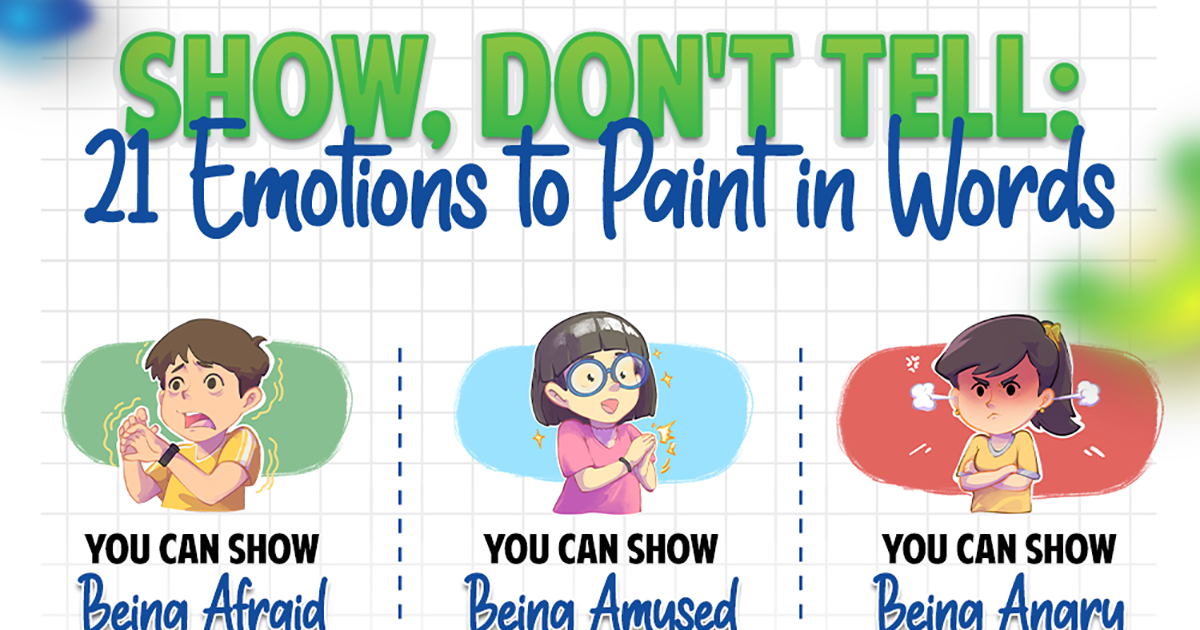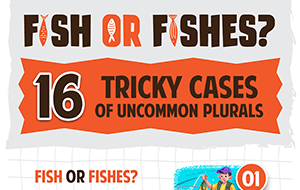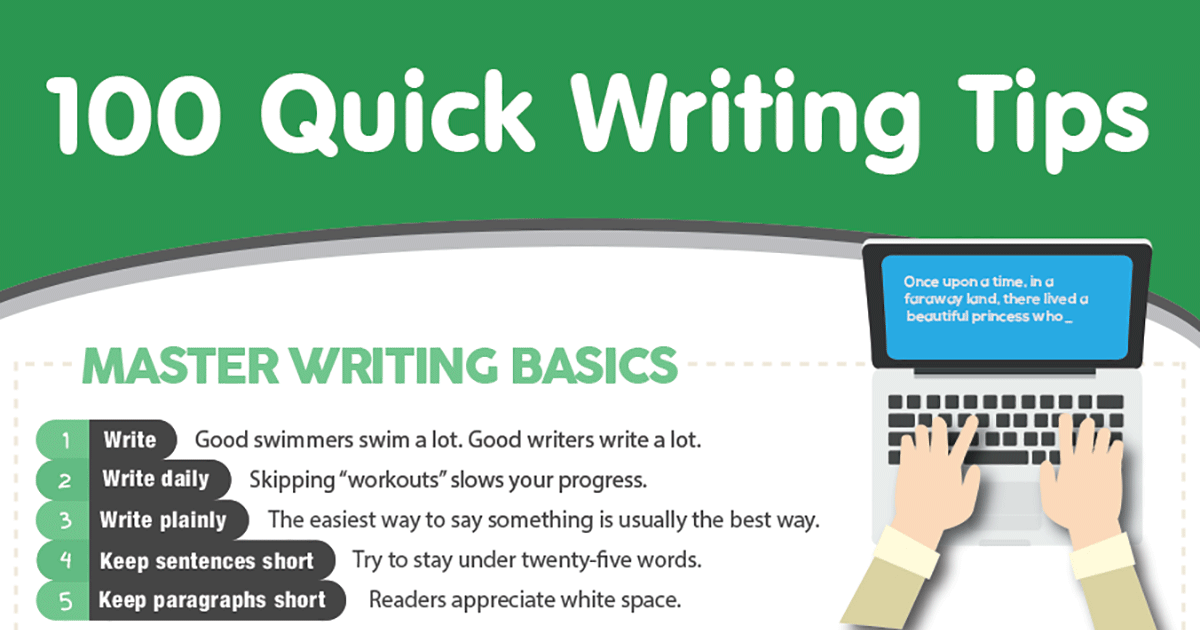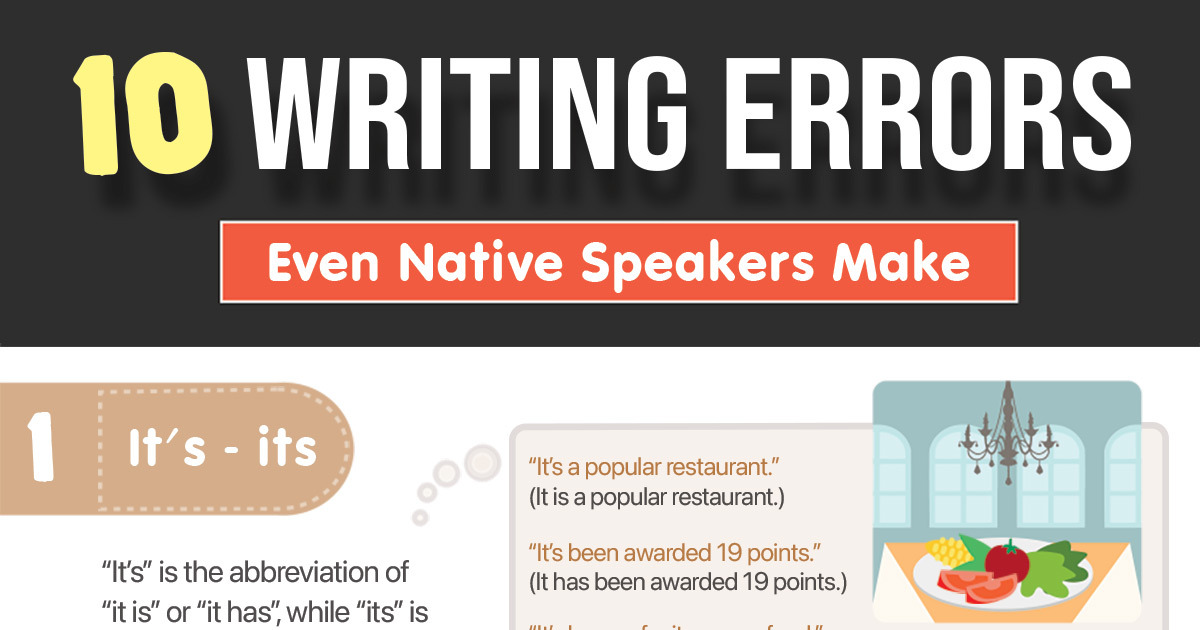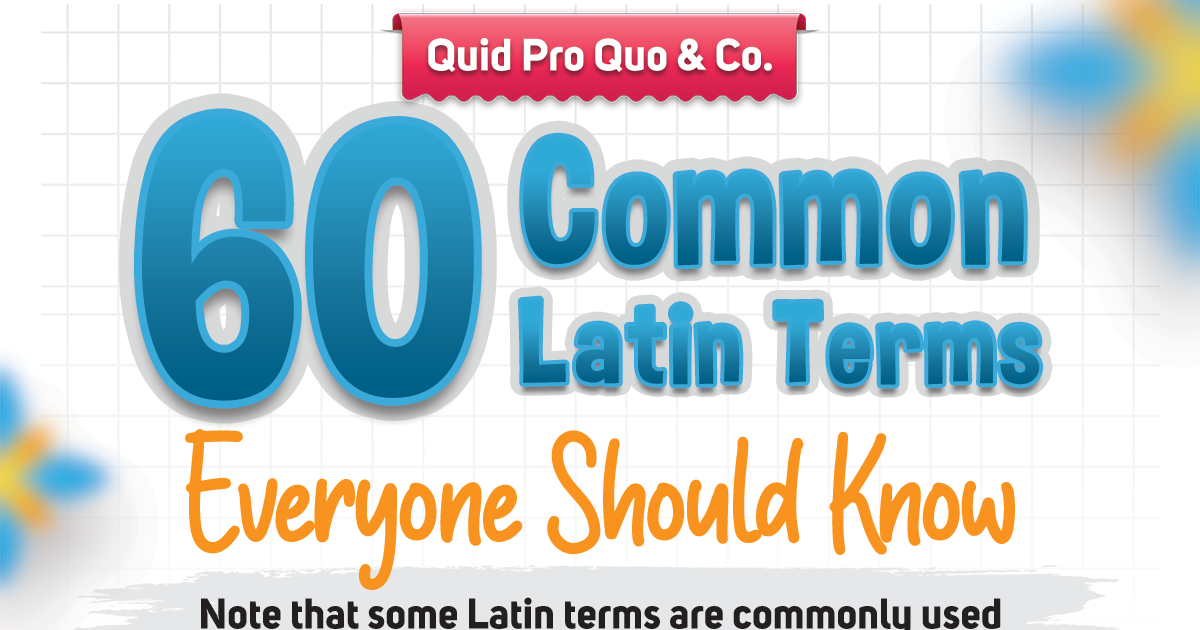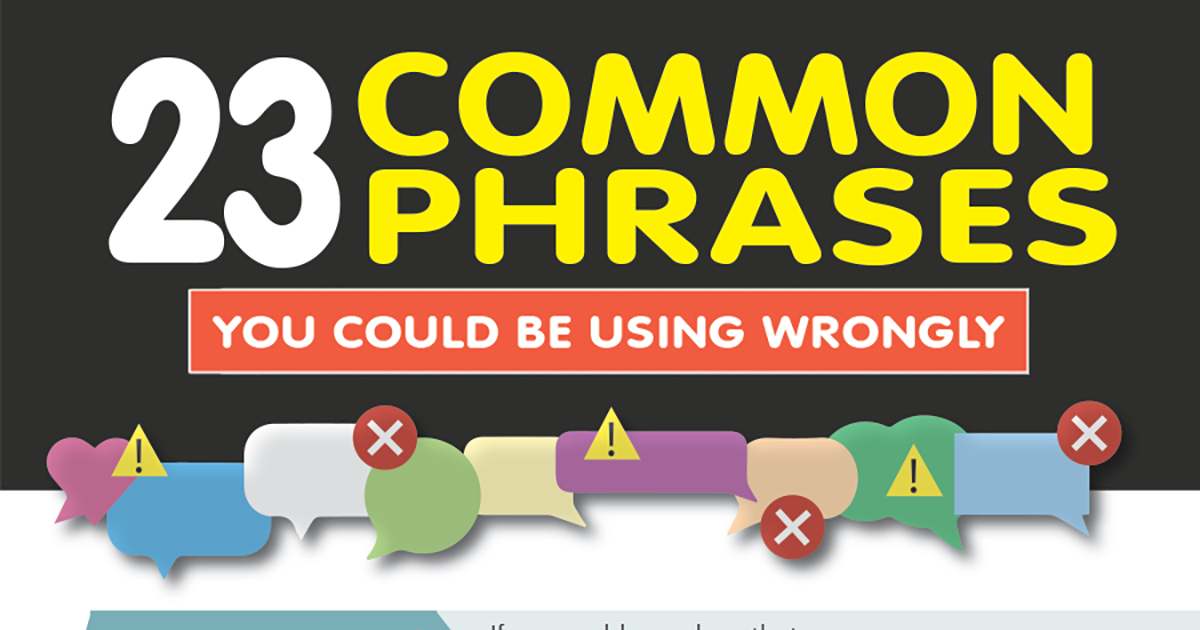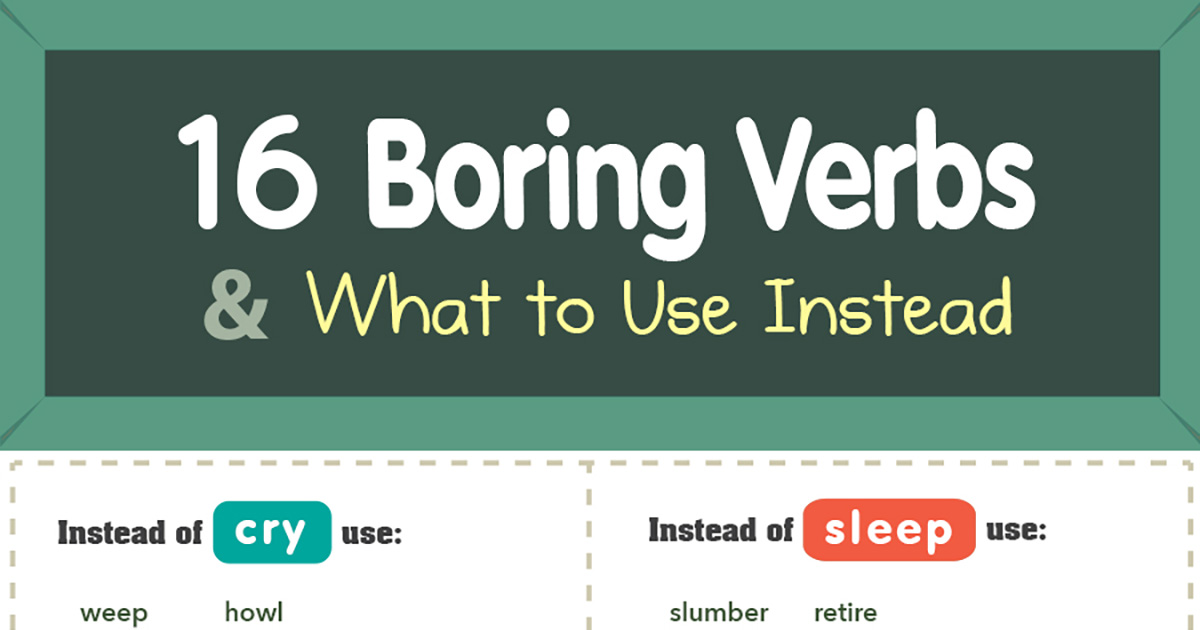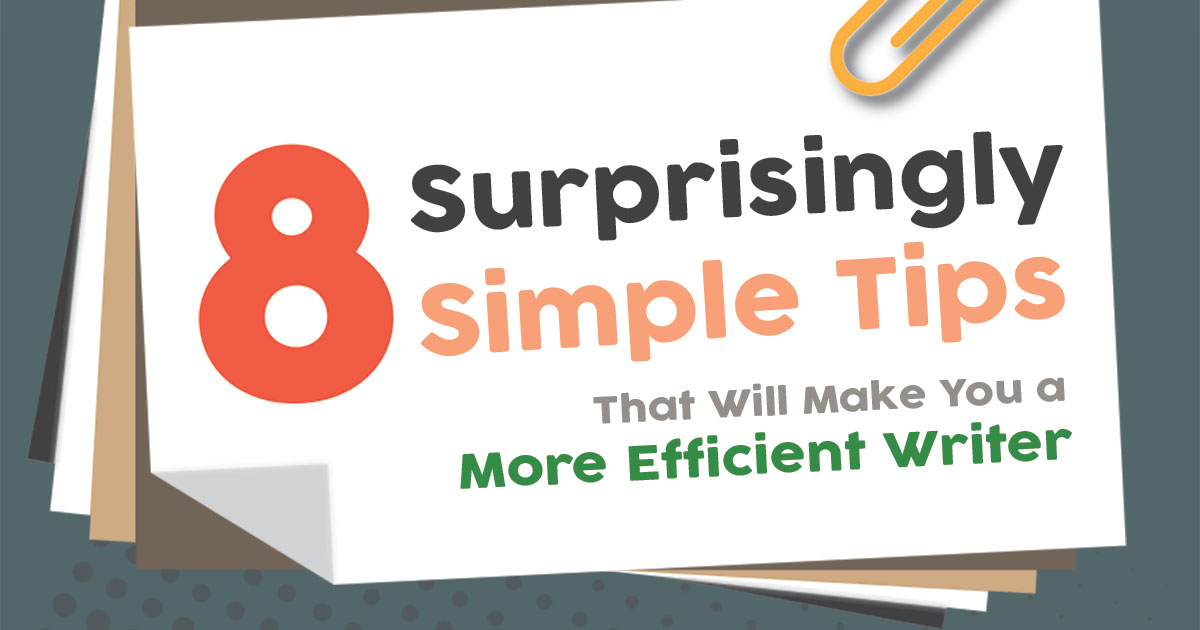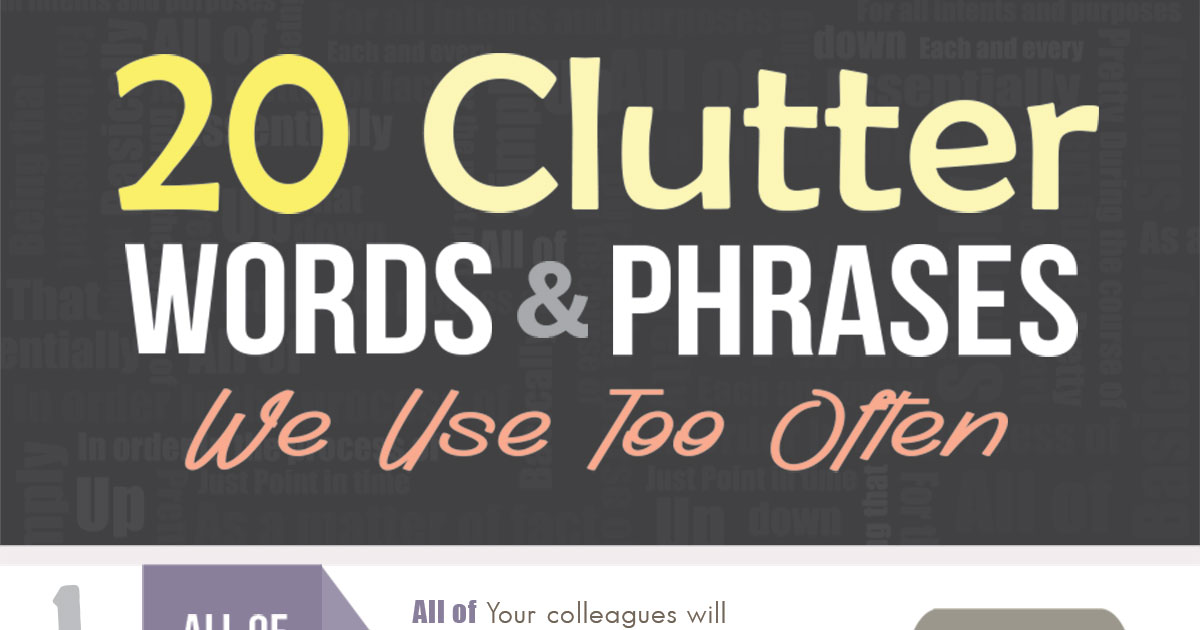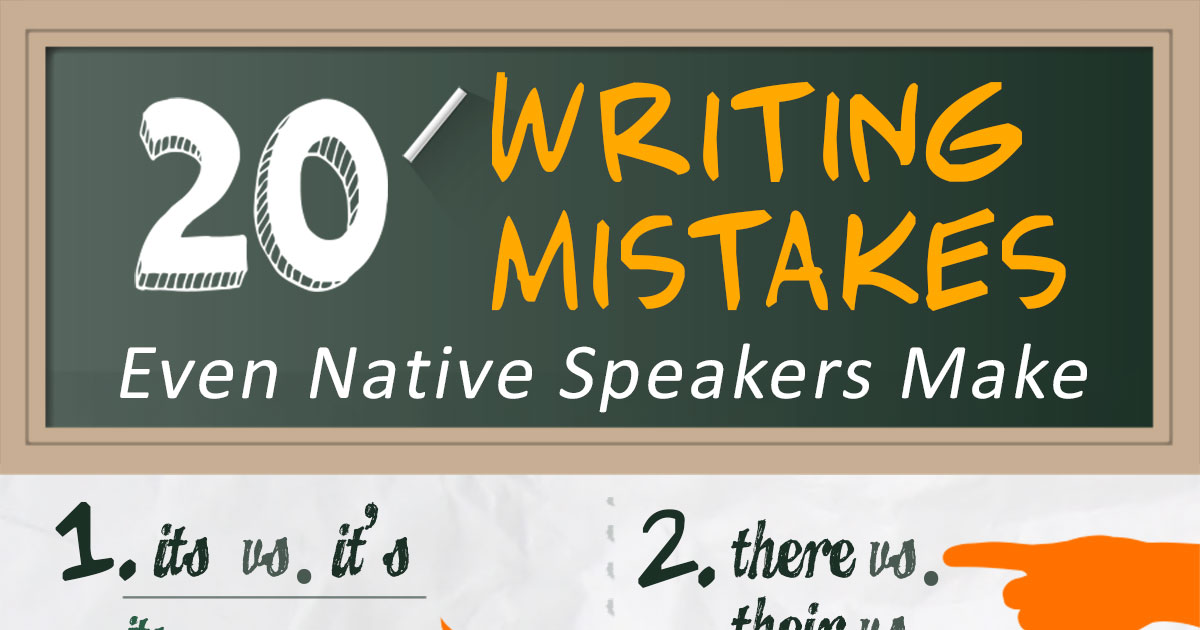 The following 44 examples of commonly confused words and phrases have also been visually represented in a set of two infographics that can be found here (part one) and here (part two). You can order the poster, which integrates both parts 1 and 2, here.
The following 44 examples of commonly confused words and phrases have also been visually represented in a set of two infographics that can be found here (part one) and here (part two). You can order the poster, which integrates both parts 1 and 2, here.
Index
- Advance vs. Advanced
- Affect vs. Effect
- Altogether vs. "All together"
- Alternate vs. Alternative
- Amount vs. Number
- Amused vs. Bemused
- Apart vs. "A part"
- Appraise vs. Apprise
- Breath vs. Breathe
- Breach vs. Breech
- Bring vs. Take
- Depreciate vs. Deprecate
- Deserts vs. Deserts vs. Desserts
- Diffuse vs. Defuse
- Disinterested vs. Uninterested
- e.g. vs. i.e.
- Economic vs. Economical
- Emigrate vs. Immigrate
- Flaunt vs. Flout
- Grisly vs. Grizzly vs. Grizzled
- "Home in" vs. "Hone in"
- Horde vs. Hoard
- Incredible vs. Incredulous
- Infectious vs. Contagious
- Its vs. It’s
- Led vs. Lead
- Less vs. Fewer
- Lie vs. Lay
- Literally vs. Figuratively
- Lose vs. Loose
- Meet vs. "Meet with"
- Me vs. Myself vs. I
- "Most important" vs. "Most importantly"
- Past vs. Passed
- Pore vs. Pour
- Preying vs. Praying
- Saw vs. Seen
- Staunch vs. Stanch
- There vs. their vs. "they’re"
- Waive vs. Wave vs. Waver vs. Waiver
- Were vs. We’re vs. Where vs. Wear
- Who vs. Whom
- Whose vs. "who’s"
- "You’re" vs. Your
1. Advance vs. Advanced
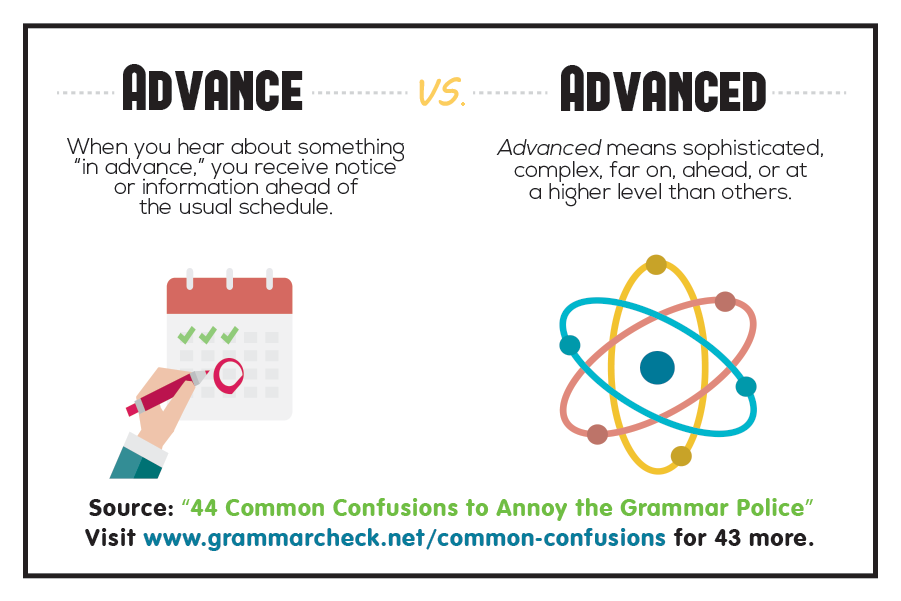
When you hear about something in advance, earlier than other people do, you receive notice or information ahead of the usual schedule. It's also commonly used when talking about receiving something, e.g., a payment, in advance.
Advanced means sophisticated, complex, far on, ahead, or at a higher level than others.
If you’re not sure whether the word should be advance or advanced, test the meaning by substituting prior. If prior makes sense, advance is probably the word that fits the context. On the other hand, you can just use prior.
Examples:
- Ludwig heard about the concert well in advance of the tickets going on sale. (Ludwig heard about the concert prior to the tickets going on sale.)
- Ludwig attended the concert with his most advanced piano students – those whom he thought would most appreciate the music.
2. Affect vs. Effect
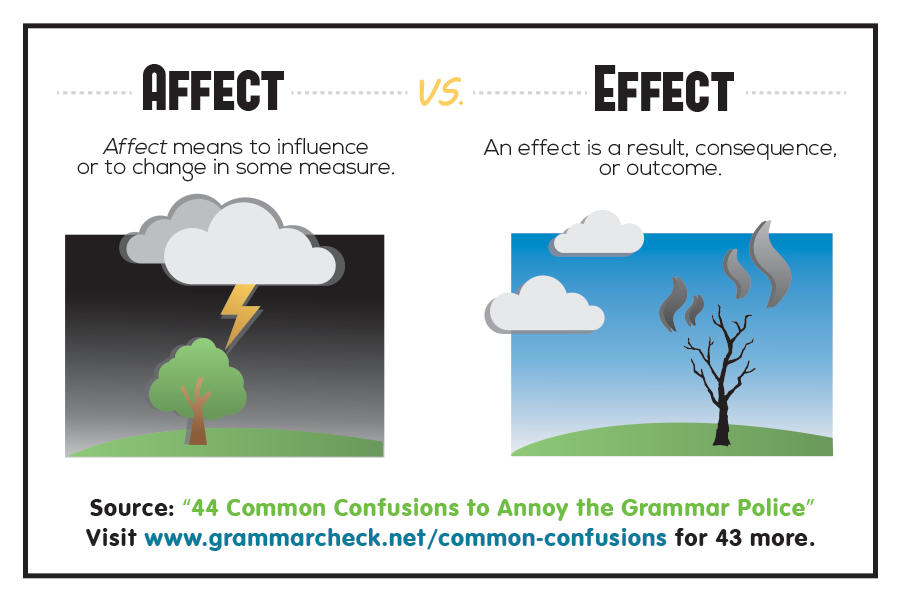
The basic rule of thumb is that affect is almost always used in its verb form, while effect is usually used in its noun form. There are exceptions, but when in doubt, stick to the rule. If you need help remembering, think of this mnemonic device: The action is affect; the end result is the effect. Affect means to influence or to change in some measure. An effect is a result, consequence, or outcome.
Examples:
- How will the new marijuana store moving in on Elm Street affect the value of nearby properties?
- One effect of legalizing marijuana is that sales of the substance can now be taxed.
Special Cases:
- Effect can also be used as a verb, in the sense of to accomplish or to bring about. (e.g., to effect a change)
- Affect is also a noun, although it is a noun rarely used outside of psychological jargon, and usually refers to the physical manifestation of an emotional state. (“The patient’s mood disorder caused him to present a flat affect, so that his face did not appear to change and he gave a constant impression of apathy.”)
3. Altogether vs. "All together"
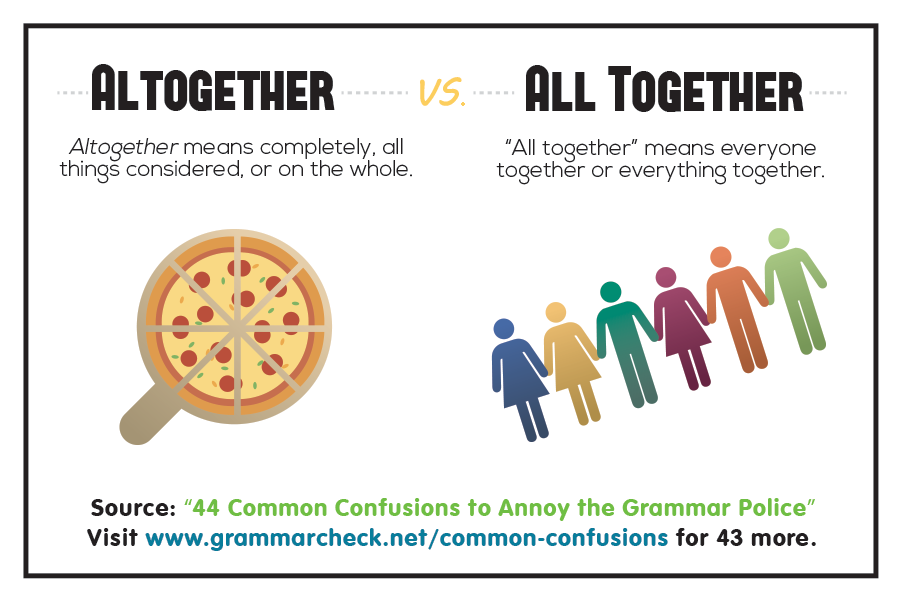
Altogether means completely, “all things considered,” or “on the whole.” “All together” means “everyone together” or “everything together.”
Examples:
- Garett appeared on stage altogether nude!
- We traveled to the circus all together, in a single very small car – as if we ourselves were the clowns.
4. Alternate vs. Alternative
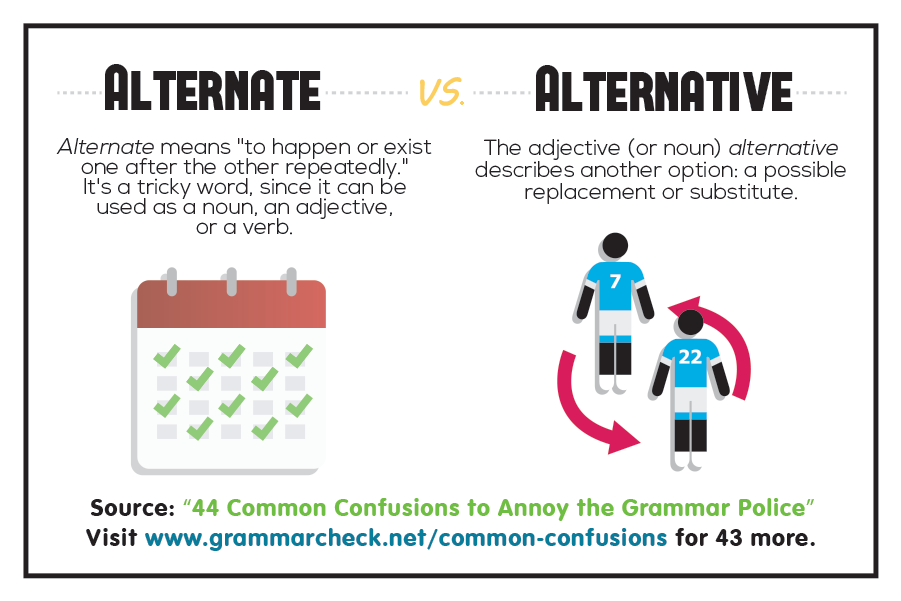
Alternate means "to happen or exist one after the other repeatedly, in a sequence." It's a tricky word since it can be used as a noun, an adjective, or a verb. It's typically the adjectival form that is confused with the word alternative.
The adjective (or noun) alternative describes another option: a possible replacement or substitute. That is not the same as alternate, which means, much more specifically, every other one in a series; every second item.
Examples:
- Kidney beans are an alternative to red meat as a source of iron in one’s diet.
- June babysits her little brother on alternate Tuesdays.
Hint:
When you think of the adjective alternate, it may help to think of an automobile’s alternator, which is based on an electric current that reverses its direction at regular intervals. The electricity changes regularly in a series; there is no replacement energy source.
An alternative might call up a mental image of a “native” – a person, rather than an automobile. Think: “alternate: alternator (change at regular intervals / car engine)” versus “alternative: person (substitute, like a substitute teacher).”
5. Amount vs. Number
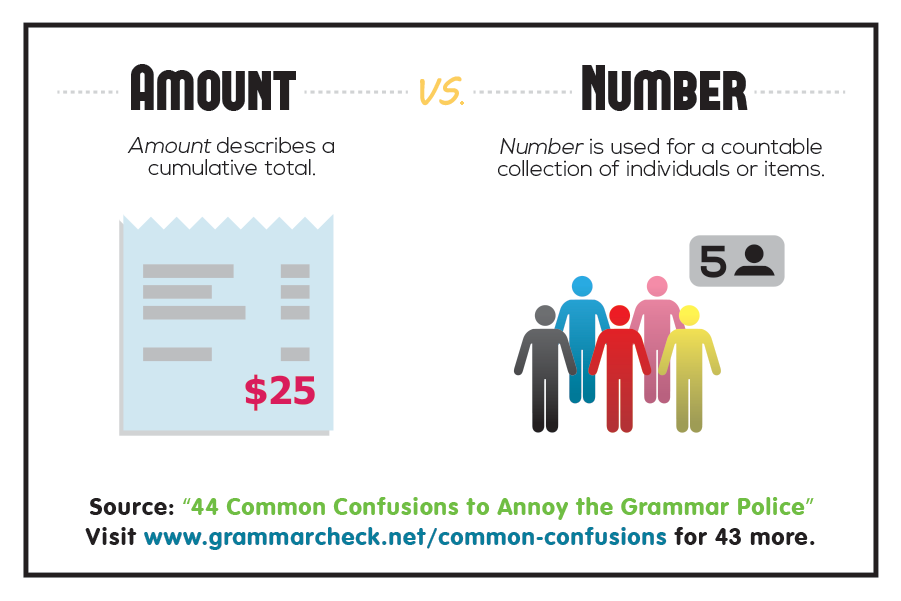
Many speakers and writers confuse number with amount. For example, the amount of people would depend on their total weight. The correct description of how many persons are present would be the number of people present.
Amount describes a cumulative total; number is used for a countable collection of individuals or items.
6. Amused vs. Bemused
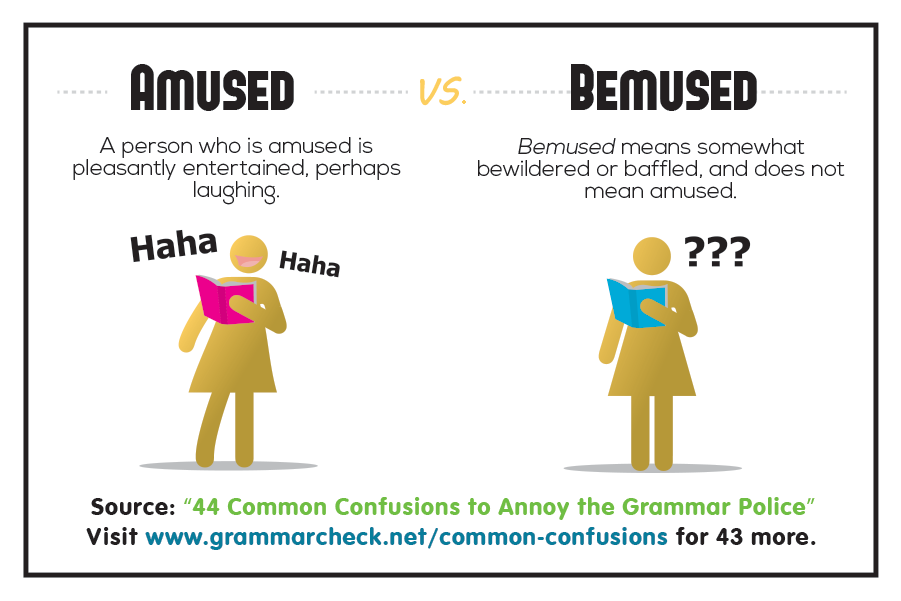
Bemused means somewhat bewildered or baffled, and does not mean amused. A person who is amused is pleasantly entertained, perhaps laughing. Both words are commonly used as adjectives and verbs.
Examples:
- The unnecessarily complex plot left me bemused.
- The silly comedy amused me.
Hint:
Bemuse and amuse both derive from muse meaning “to ponder” or “to be lost in thought.” But the be– of bemused essentially means extremely or “to excess,” as it does in words like bewitched, bedazzled, and befuddled. So if you’re “extremely lost in thought,” then you’re utterly confused, or bemused.
7. Apart vs. "A part"
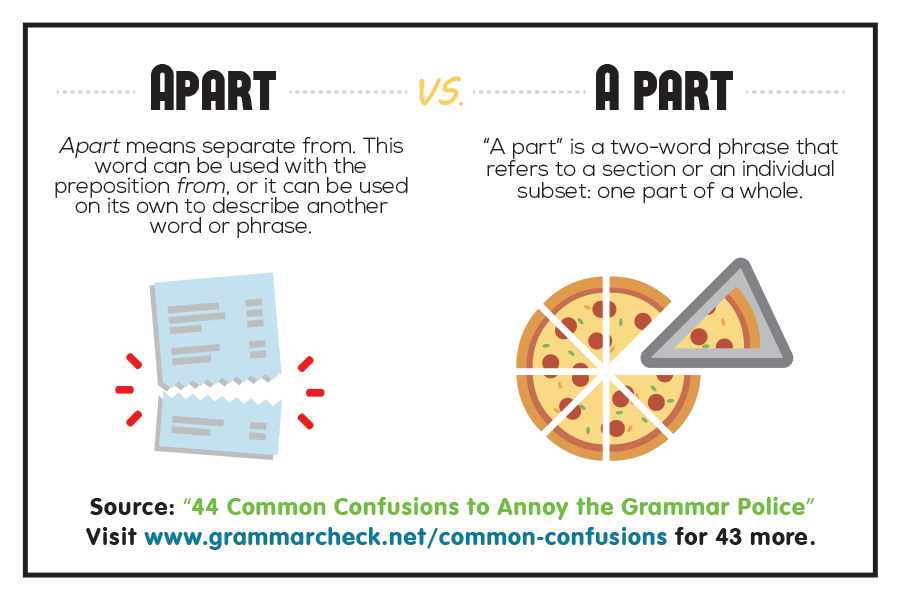
Apart means separate from. This word can be used with the preposition from, or it can be used on its own to describe another word or phrase.
"A part" is a two-word phrase that refers to a section or an individual sub-set: one part of a whole.
Examples:
- It was Helen’s rare beauty that set her apart from dullness of Troy. She was, indeed, a woman apart.
- The wooden horse designed by Odysseus was a part of the treachery that the Greeks used to defeat the town of Troy.
Hint:
The phrase "a part" has itself been split into parts; it is presented in two sections.
8. Appraise vs. Apprise
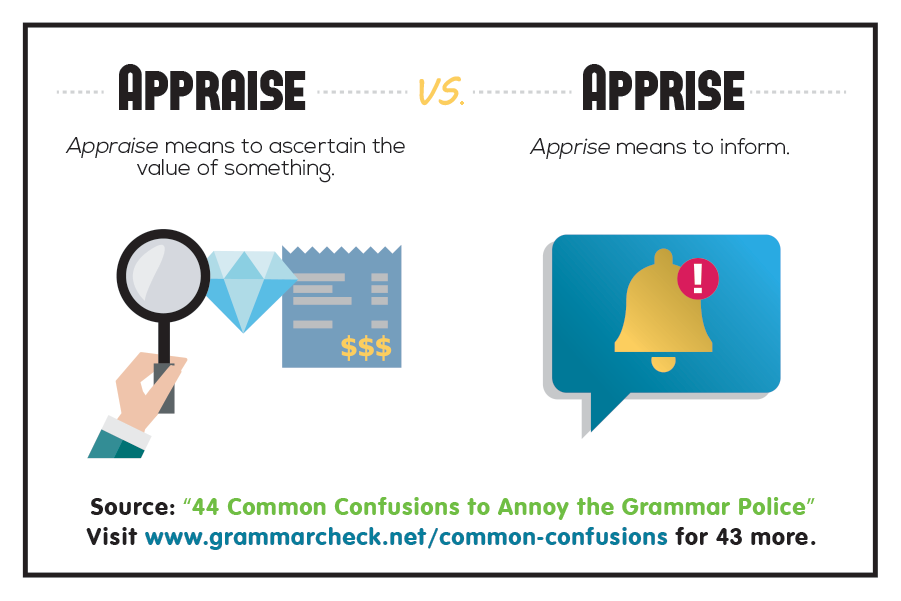
Appraise means to ascertain the value of something, and does not mean “to apprise or inform.”
Examples:
- I appraised the jewels.
- I apprised him of the situation.
Hint:
Appraise and appraisal both come from the same root as does price, and so refer to cost or money. Apprise comes from the same root as does apprentice, and so refers to knowledge or information.
9. Breath vs. Breathe
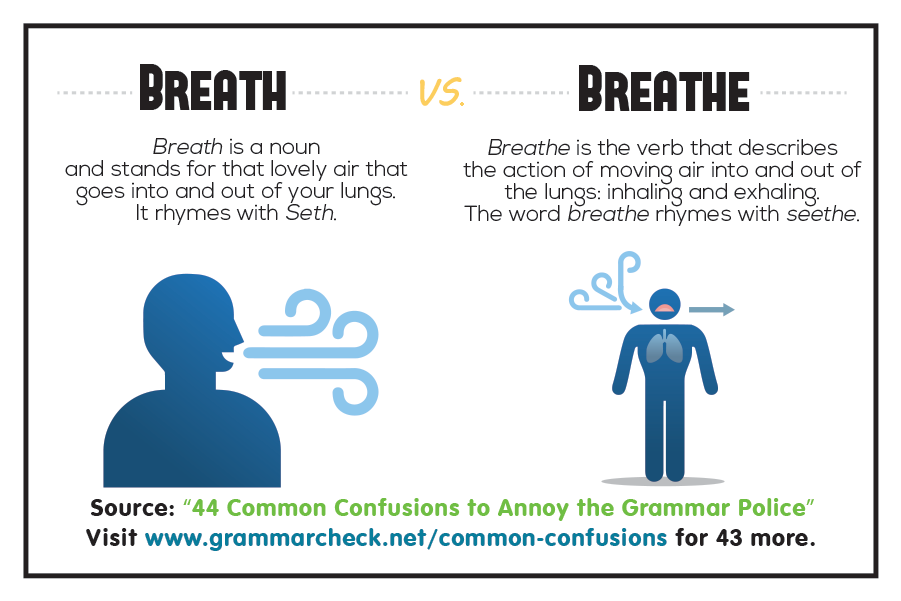
The two words listed here aren’t typically confused when they are spoken aloud; their pronunciation is quite distinct. However, the two are often confused in writing.
The form of the word without the final –e (breath) is the noun that is pronounced to rhyme with death, but that means the soft oxygenated wind that is necessary to air-breathing life forms.
When a final –e is added, the word becomes the verb that describes the action of moving that lovely air into and out of the lungs: inhaling and exhaling. The word breathe rhymes with seethe.
Examples:
- In winter, I can see my breath.
- When Karl’s asthma is bad, he cannot breathe very easily.
Hint:
Breath rhymes with death and neither word has an –e on the end of it.
10. Breach vs. Breech
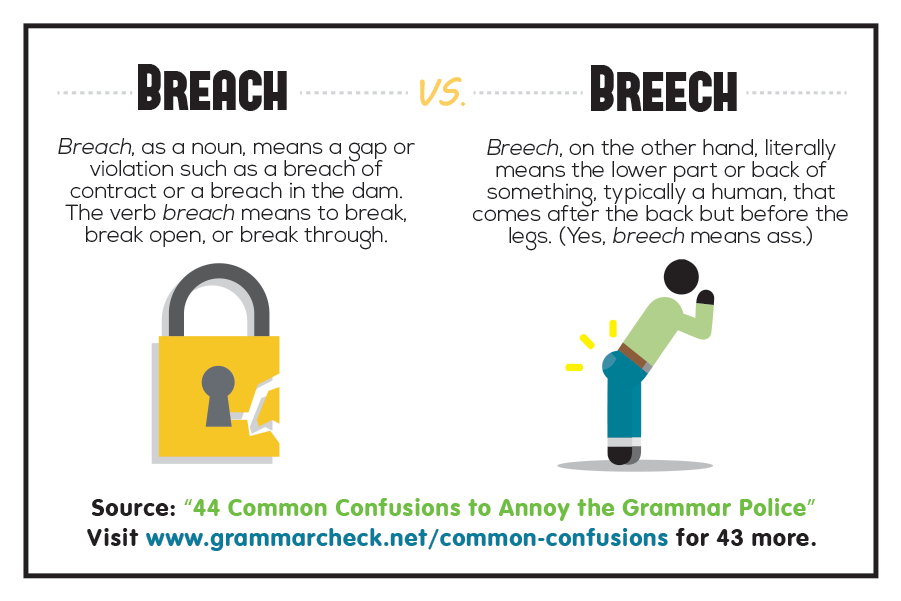
Breach, as a noun, means a gap or violation such as a breach of contract or a breach in the dam.
The verb breach means to break, break open, or break through.
Breech, on the other hand, literally means the lower part or back of something, typically a human, that comes after the back but before the legs. (Yes, breech means ass.)
11. Bring vs. Take
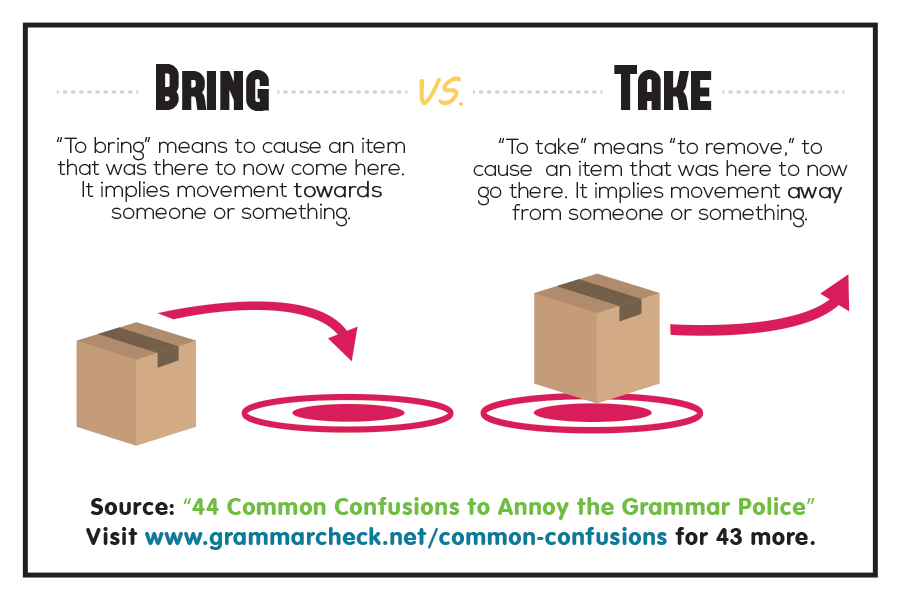
"To bring" means to cause an item that was there to now come here; it is to import, or to carry toward. This is true even if “here” is somewhere that the speaker or writer may be in the future – for example, a party where it is planned that everyone will bring food to share.
"To take" is to remove, to cause an item that was here to now go there; it is to carry away.
Examples:
- “Bring me one of each type of dessert that you offer, for me to try! I’ll
bring a slice of the chocolate cake home for Tommy.” - “Now, please take these dirty dishes to the kitchen.” It might sound okay (although it is not correct) to say: “Now, please bring these dirty dishes to the kitchen.” Bring isn’t correct, however, because the speaker is not in the kitchen and will presumably not be there when the dirty dishes arrive. The kitchen is not the speaker’s “here,” and so the correct description of movement is that of taking dishes away to the kitchen – to “there.”
12. Depreciate vs. Deprecate
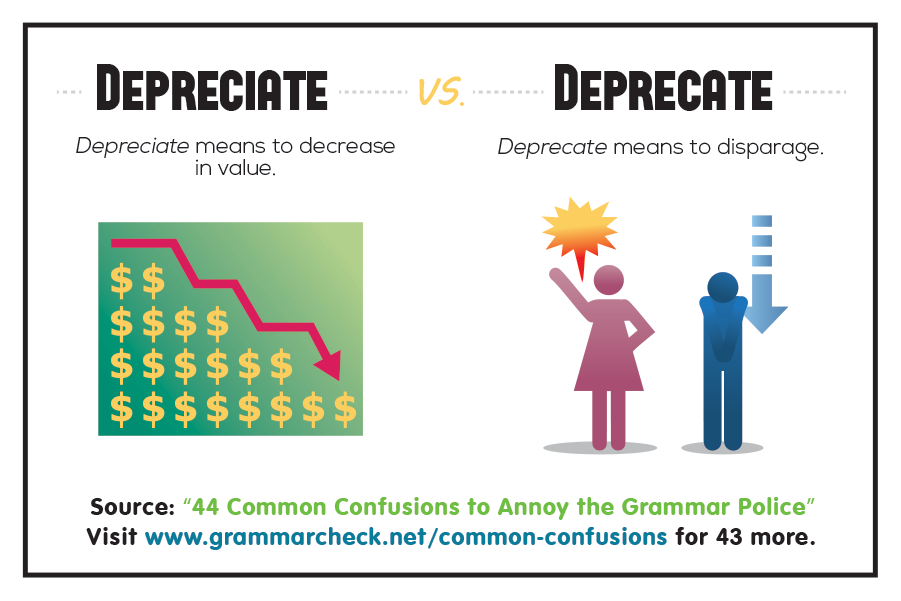
Depreciate means to decrease in value, and does not mean to deprecate or to disparage.
Examples:
- My car has depreciated a lot over the years.
- She deprecated his efforts.
Hint:
Like appraise, depreciate comes from the Latin word for price, whereas deprecate comes from the Latin for pray and literally means “to pray against or for deliverance from something,” so deprecate is now used to mean “to express criticism of.”
13. Deserts vs. Deserts vs. Desserts
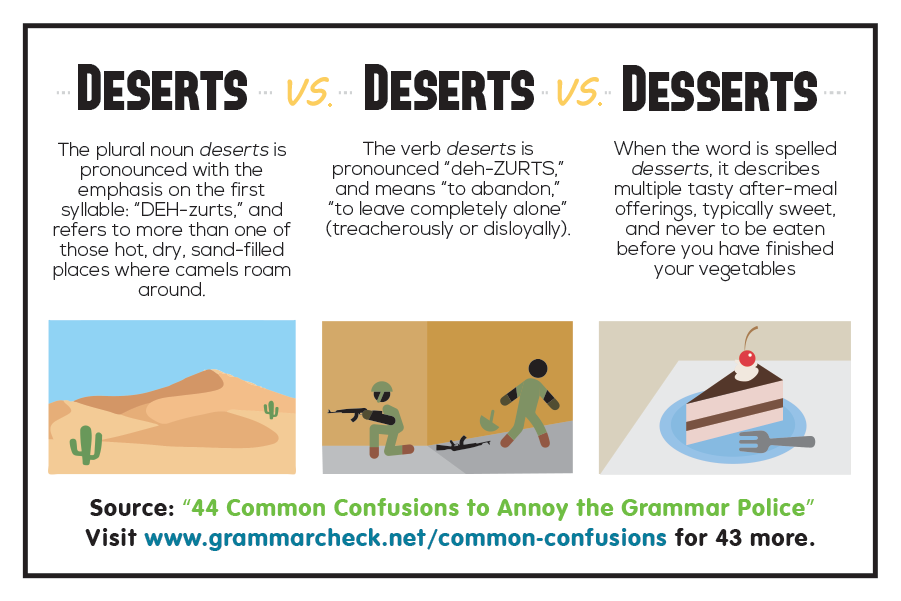
The verb deserts is pronounced “deh-ZURTS,” and means "to abandon," to leave completely alone (treacherously or disloyally). The plural noun that is spelled exactly the same, deserts, is pronounced with the emphasis on the first syllable: “DEH-zurts,” and refers to more than one of those hot, dry, sand-filled places where camels roam around.
When the word is spelled desserts, it most often describes multiple tasty after-meal offerings, typically sweet, and never to be eaten before you have finished your vegetables.
Fun to know:
The word desserts may also be used in the set phrase “just desserts,” which is, oddly, used in the singular. “Just desserts” means “what is deserved” or “what is merited.” (as in: “Of course he’s in prison; that’s his just desserts.”) Technically, this usage, although now accepted, is incorrect, because the phrase “just desserts” is actually a corruption of the correctly spelled original: “just deserts.”
14. Diffuse vs. Defuse
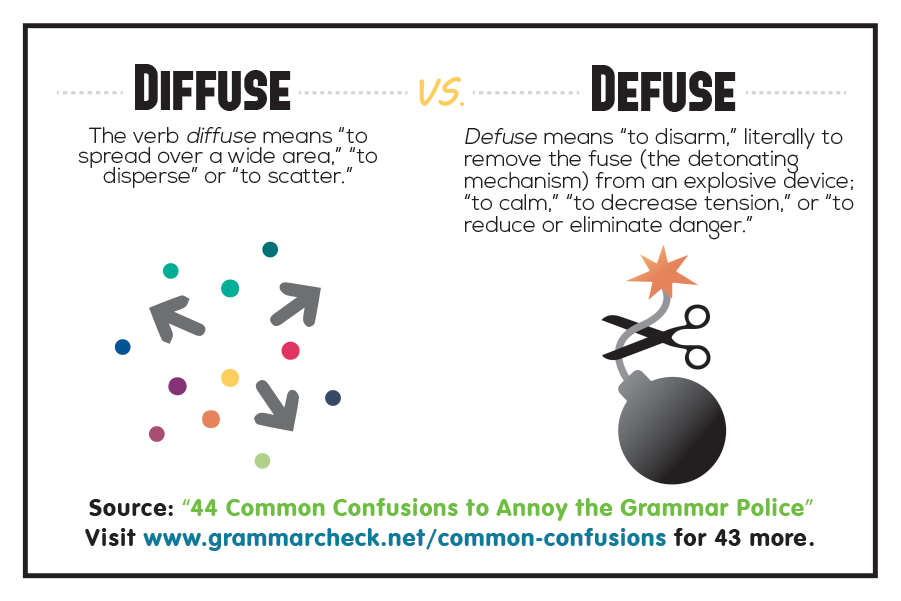
"To diffuse" (pronounced to rhyme with muse) means to spread over a wide area, to disperse or scatter. Defuse means to disarm, literally to remove the fuse (the detonating mechanism) from an explosive device; to calm, to decrease tension, or to reduce or eliminate danger. Diffuse can also be an adjective, pronounced to rhyme with “moose,” and that means scattered/ spread out, or may mean lacking clarity or focus, rambling.
Examples:
- The soft glow from this lamp will diffuse over the entire area.
- The negotiator is skilled and we hope she will be able to successfully defuse the hostage situation.
15. Disinterested vs. Uninterested
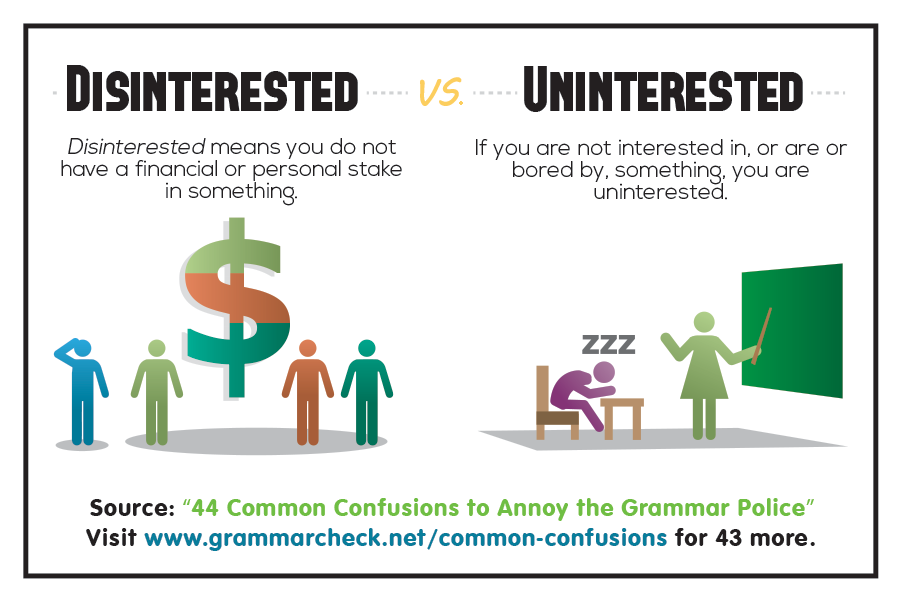
Often mistaken for synonyms, disinterested and uninterested are actually not at all interchangeable. If you are not interested in, or are or bored by, something, you are uninterested. However, disinterested means you do not have a financial or personal stake in something.
Disinterested means being impartial or neutral.
Examples:
- The dispute should be resolved by a disinterested judge.
- Why are you so uninterested in my story?
Hint:
The trick to remembering this one is that disinterest is a word on its own, while uninterest isn’t. If you disinterest yourself, you remove your “interest” or concern in something, whereas if you’re just not interested in it, then you’re uninterested.
16. e.g. vs. i.e.
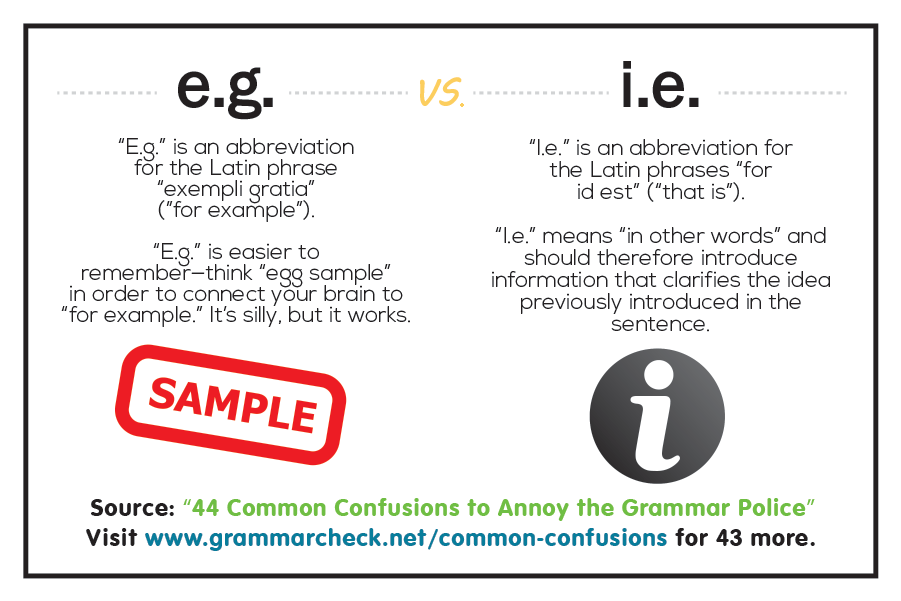
Both e.g. and i.e. are abbreviations for Latin phrases. i.e. stands for id est (“that is”) and e.g. stands for exempli gratia (“for example”).
A good way to remember the difference: i.e. means “in other words” and should therefore introduce information that clarifies the idea previously introduced in the sentence.
Example:
- I expect that we’ll end up relying on the most experienced Boy Scouts to set up the campsite (i.e., Jeff and Mike).
The expression i.e. is great for introducing parenthetical statements, because it sets off a bit of nonessential or extra information. You can actually enclose it with parentheses or not, depending on how much distance you want to put between two concepts.
E.g. is easier to remember—think “egg sample” in order to connect your brain to “for example.” It’s silly, but it works.
Example:
- I don’t have time to cook dinner tonight. Can you pick up something? e.g., Pizza or takeout?
Important:
- Neither i.e. nor e.g. is ever capitalized.
- Each abbreviation is always followed by a comma after the second period, in order to separate the abbreviation from the information that it identifies: i.e., and e.g.,
17. Economic vs. Economical
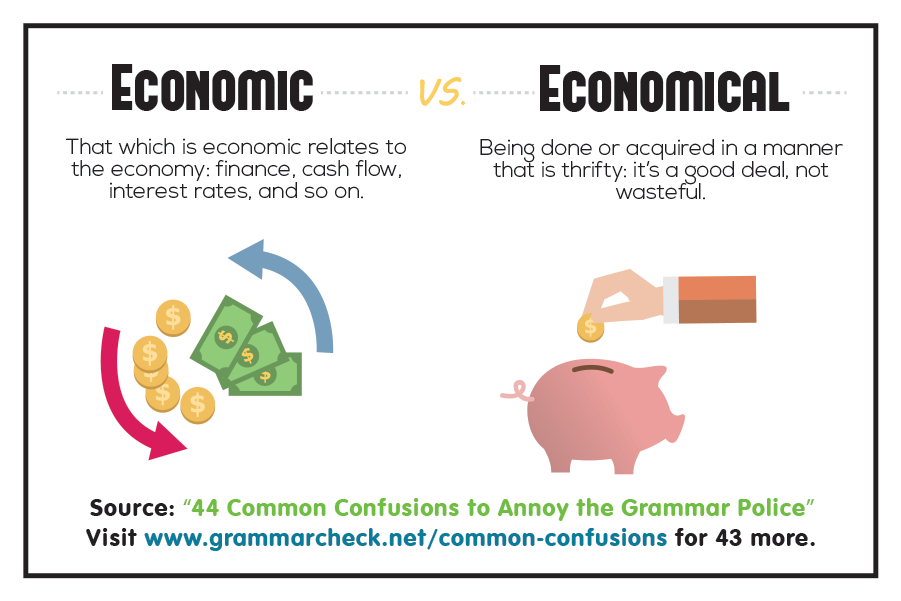
That which is economic relates to the economy: finance, cash flow, interest rates, and so on. If an item or a situation is described as economical, its specific relationship to money is that it is being done or acquired in a manner that is thrifty: it’s a good deal, not wasteful.
Examples:
- The outcome of next year’s election will depend greatly on improvements in the country’s economic conditions.
- Louis prefers buying the triple-sized rolls of toilet paper, as that is the most economical way the item is packaged for purchase.
18. Emigrate vs. Immigrate
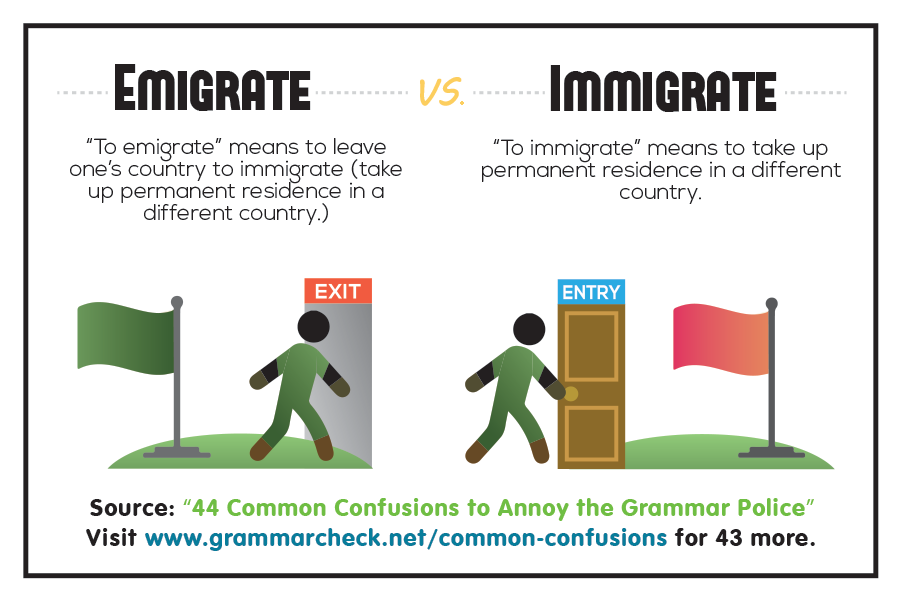
The difference between emigrating and immigrating is all in the point of view of the person who is describing the action. "To emigrate" means to leave one country in order to immigrate into another, different country – that is, to take up permanent residence in the new country.
Example:
François made plans to emigrate from Canada so that he could immigrate to the United States.
Hint:
Think of emigrating as exiting. Think of immigrating as coming into.
19. Flaunt vs. Flout
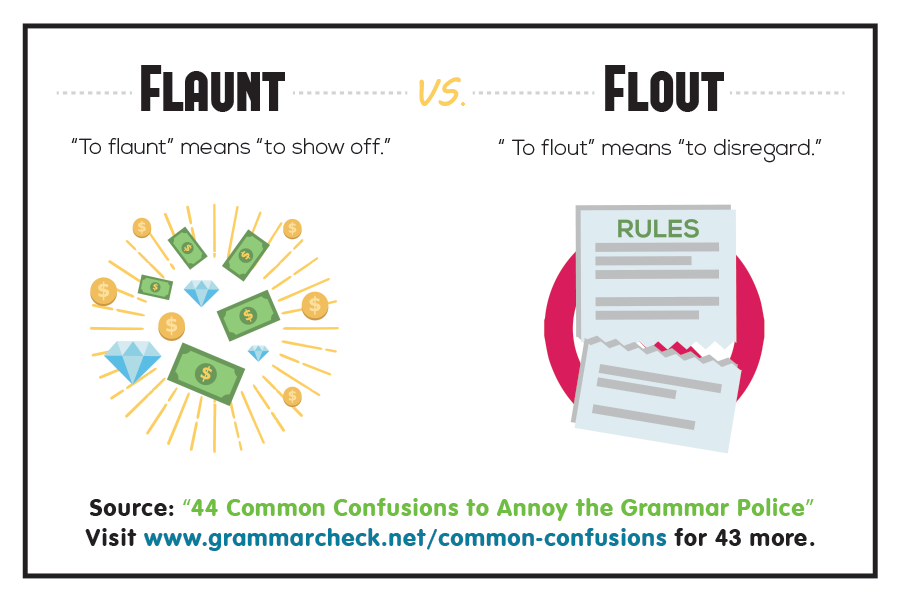
"To flaunt" means "to show off."
"To flout" means "to disregard."
Examples:
- Fiona tricked Instagram by flaunting a large stash of plastic jewels and play money for 12 Likes and 25 comments.
-
Daddy alone will be responsible for keeping the couch free from crumbs if she continues to flout late-night snacking rules.
Hint:
- Flaunt - an aunt so awesome she needs to be shown off.
20. Grisly vs. Grizzly vs. Grizzled
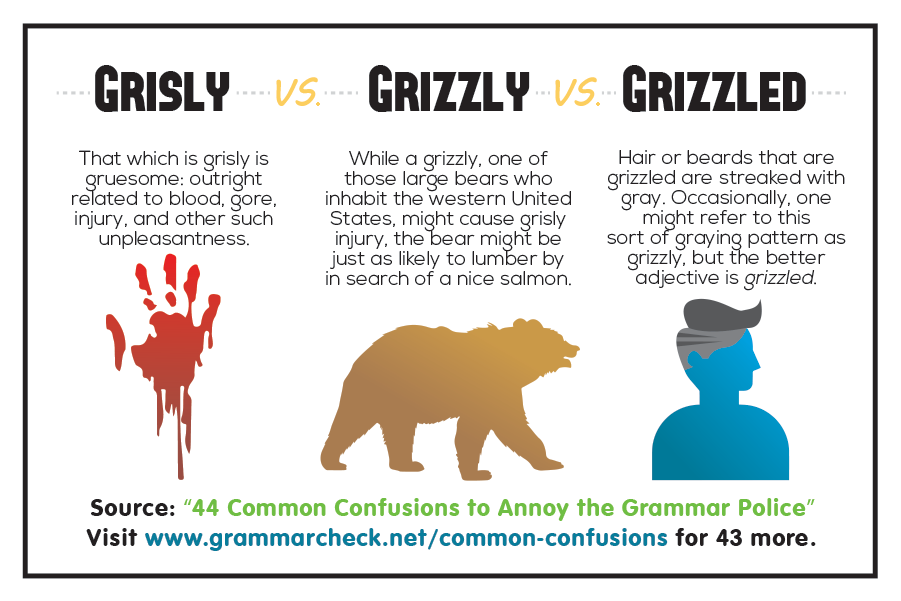
That which is grisly is gruesome: outright related to blood, gore, injury, and other such unpleasantness.
While a grizzly, one of those large bears who inhabit the western United States, might cause grisly injury, the bear might be just as likely to lumber by in search of a nice salmon.
Hair or beards that are grizzled are streaked with gray. Occasionally, one might refer to this sort of graying pattern as grizzly, but the better adjective is grizzled.
Examples:
- The medical intern knew that the patient’s leg had been torn off at the scene of the accident, and she braces herself for a grisly procedure.
- As Emily watched the Memorial Day parade, she saluted the grizzled old men who, she knew, had once been dashing young soldiers.
21. "Home in" vs. "Hone in"
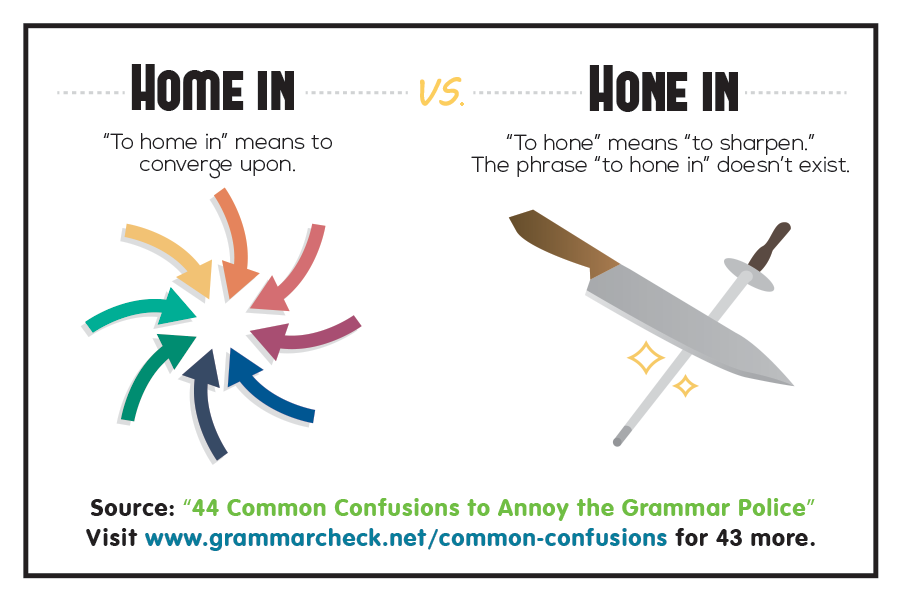
"To home in" means to converge upon."To hone" means "to sharpen." The phrase "to hone in" doesn't exist.
Examples:
- She honed her writing skills.
- We're homing in on a solution.
Hint:
The best way to remember this one is that hone is also another word for a whetstone (a stone used to sharpen razors and knives), and the verb hone derives from the image of things being sharpened. When you think of "homing in," think of a baseball player heading straight for the goal: home base.
22. Horde vs. Hoard
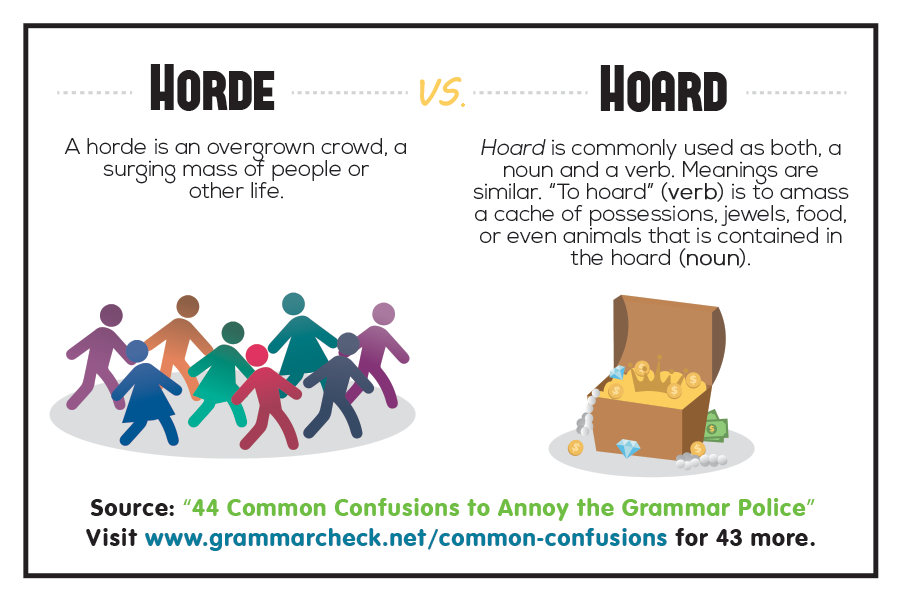
A horde is an overgrown crowd, a surging mass of people or other life.
Hoard is commonly used as both a noun and a verb, and the meanings are similar. A hoard is a carefully guarded store of whatever is precious to its owner. "To hoard" (verb) is to amass a cache of possessions, jewels, food, or even animals that are contained in the hoard (noun).
Examples:
- Genghis Khan and his terrifying horde of soldiers took over much of ancient Asia.
- No one suspected that the simple old woman’s attic held a hoard of rare gold coins.
23. Incredible vs. Incredulous
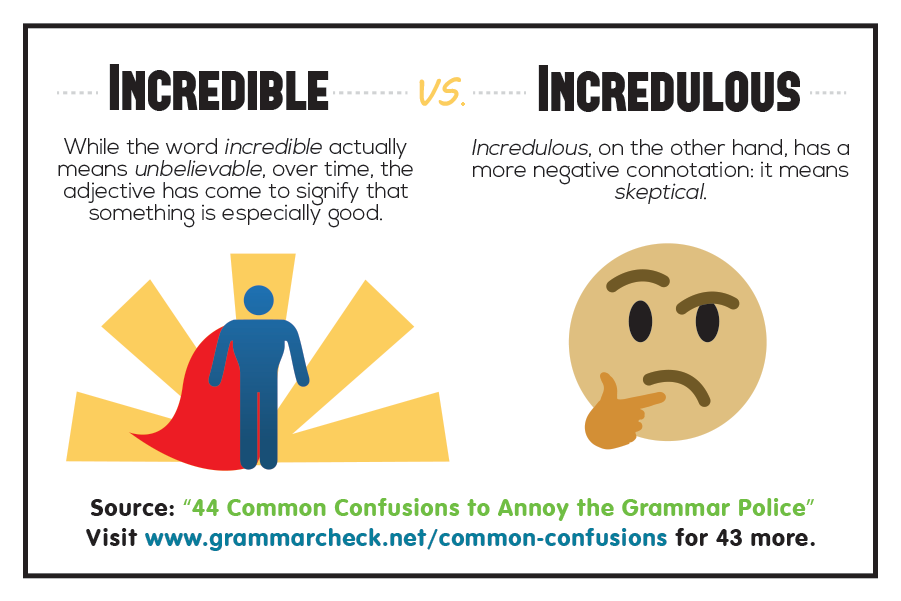
While the word incredible actually means unbelievable, over time, the adjective has come to signify that something is especially good. Incredulous, on the other hand, has a more negative connotation: it means skeptical. And while incredible applies to the thing, situation, person, etc. being described, the word incredulous describes only a person himself or herself, the one who is skeptical – that is, who is incapable of credulity or belief.
Examples:
- The incredulous crowd watched as a man dressed in a red-and-blue bodysuit climbed the building, without using any ropes.
- The man in the body suit performed an incredible feat.
24. Infectious vs. Contagious
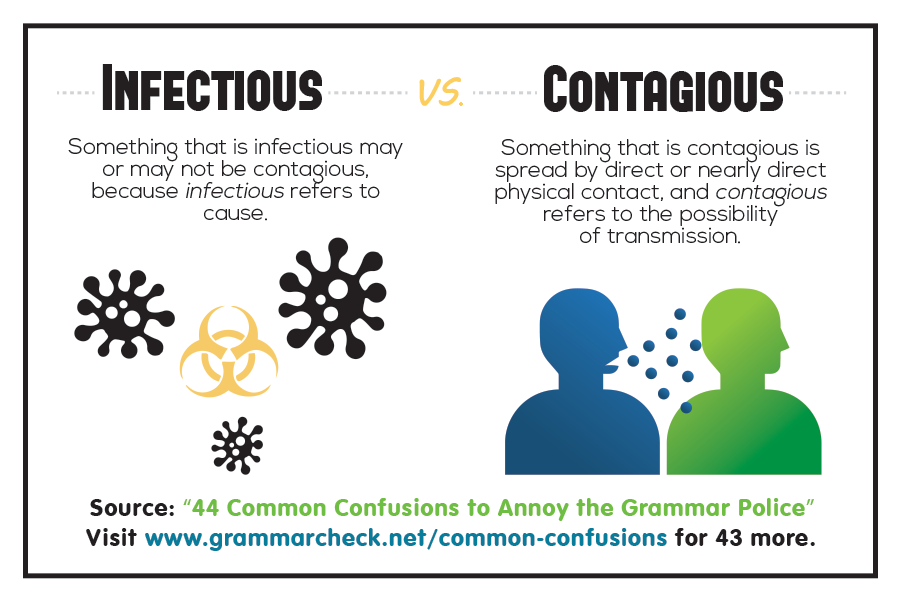
Something that is contagious is spread by direct or nearly direct physical contact, and contagious refers to the possibility of transmission. Something that is infectious may or may not be contagious, because infectious refers to cause. You can be infected by a sickness that is not contagious: tetanus, for example, or pneumonia. Both are infectious but not contagious.
25. Its vs. It’s
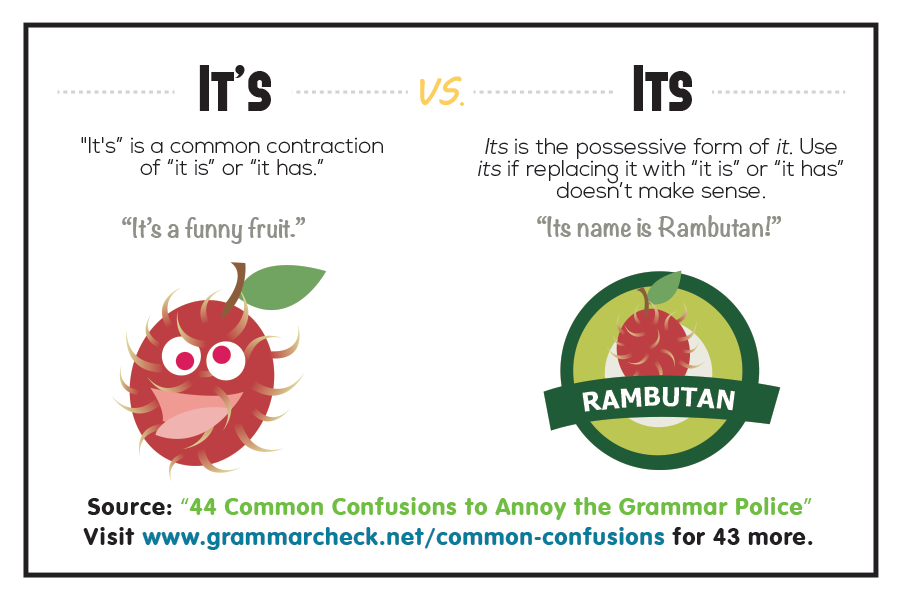
26. Led vs. Lead
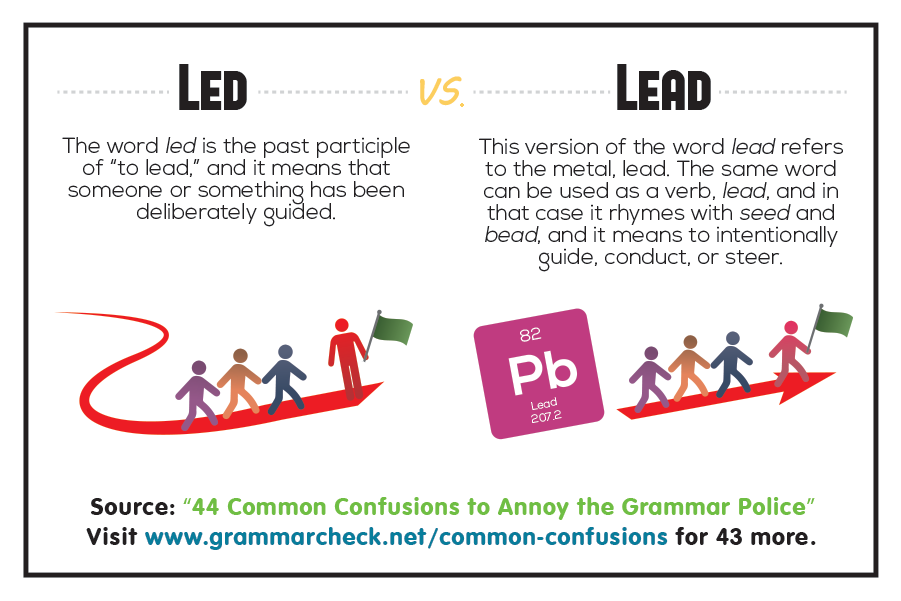
The word led is the past participle of “to lead,” and it means that someone or something has been deliberately guided. There is a word that sounds exactly the same, but is spelled with an extra “a”: lead. This version of the word lead refers to the metal, lead. Then, just to keep life confusing, the same word can be used as a verb, lead, and in that case, it rhymes with seed and bead, and it means to intentionally guide, conduct, or steer.
Examples:
- General George S. Patton led the Third Army through Europe during World War II.
- The metal lead is widely used in the manufacture of car batteries.
- LeBron James will lead his basketball team to victory.
27. Less vs. Fewer
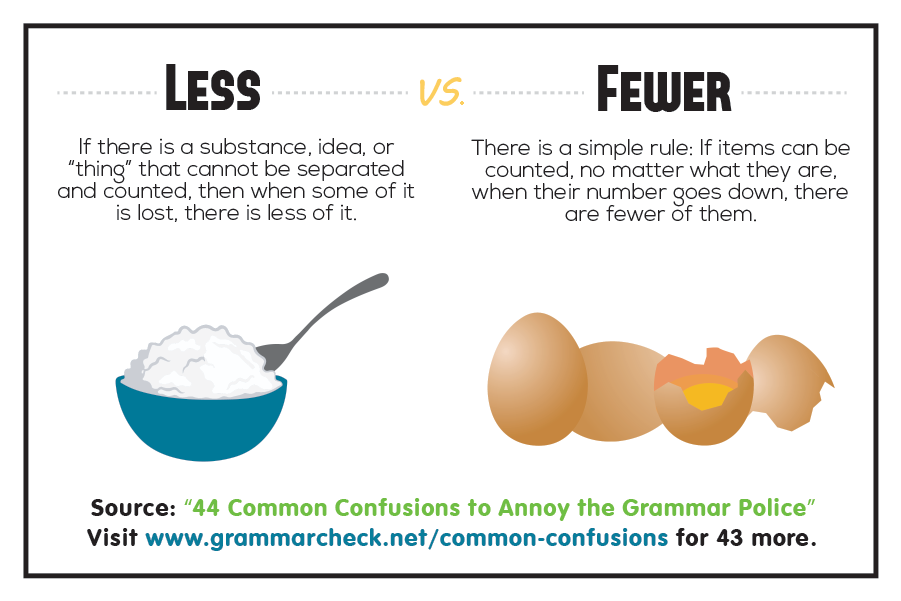
There is a simple rule: If items can be counted, no matter what they are, when their number goes down, there are fewer of them. If there is a substance, idea, or “thing” that cannot be separated and counted, then when some of it is lost, there is less of it.
Examples:
- There are fewer clouds today than yesterday, so there is less cloud cover.
- I have lost fewer pounds this week than last, but I still weigh less than I did in February. [“weight” cannot be separated or counted]
- There is much less confusion now, and a result, there are fewer questions.
Hint:
When in doubt, use the Cottage Cheese Rule: You cannot, with a straight face, say “fewer cottage cheese.” If an item cannot be separated into distinct, individual items, you must use the word less. “Less cottage cheese. Fewer eggs.”
28. Lie vs. Lay
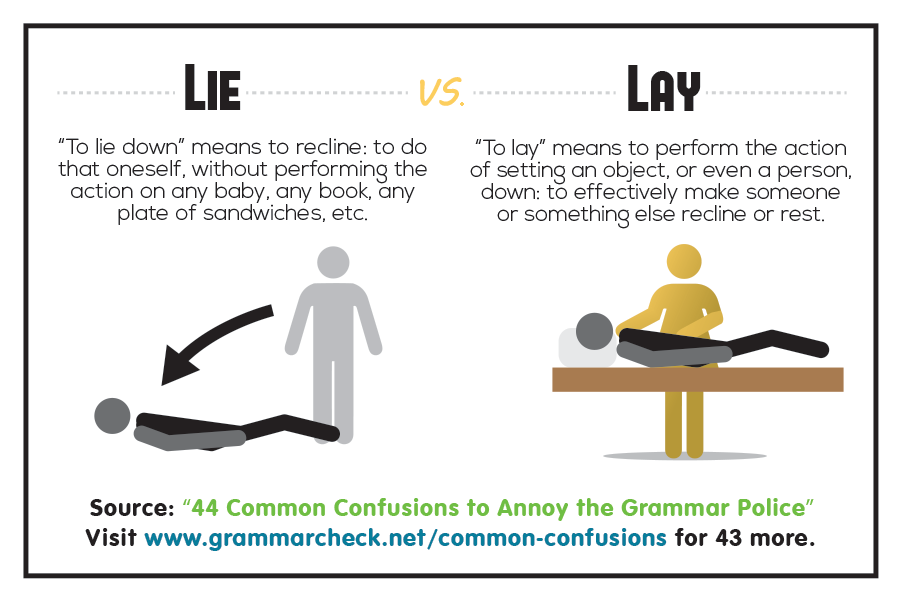
The confusion between these words comes about when they are used in their verb forms to describe the action of reclining/resting and the action of placing a person, animal, or object somewhere. "To lie down" means to recline: to do that oneself, without performing the action on any baby, any book, any plate of sandwiches, etc.
"To lay" means to perform the action of setting an object, or even a person, down: to effectively make someone or something else recline or rest. (Of course, in the well-known prayer, one can even “lay” oneself: “Now I lay me down to sleep...” This is correct, as long as the words treat “me” as an object, an else: “I lay me...”)
Examples:
- I think I’ll lie down for a little nap.
- I think I’ll lay my book down next to me before my nap.
29. Literally vs. Figuratively
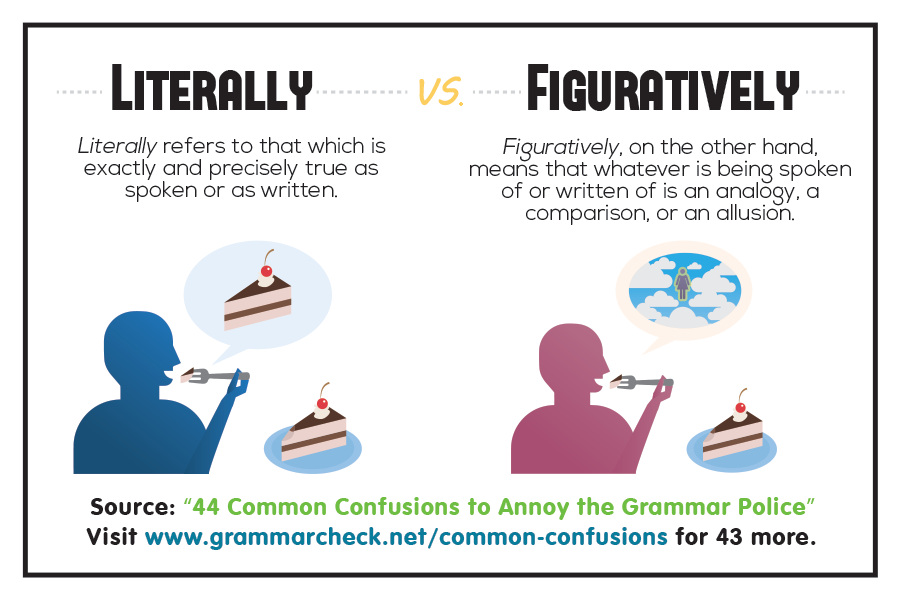
Very few words are so abused as is the poor, beleaguered word literally. This word seems to have come to mean “I really, really mean this.” It is used (quite incorrectly) as an intensifier. Trust us: You sound pretty dumb when you misuse the word literally. Stop doing that!!!
Literally refers to that which is exactly and precisely true as spoken or as written. Figuratively, on the other hand, means that whatever is being spoken of or written of is an analogy, a comparison, or an allusion.
Examples:
- That is literally the best omelet I have ever eaten. [The speaker really, truly, absolutely means that he or she has never, ever tasted an omelet that is superior to this one.]
- Our best high school sprinter is a figurative Kentucky Derby winner. [The high school runner is a human, not a horse – but the comparison is meant to show that the sprinter is very, very fast! The comparison is an analogy; it isn’t literal.]
- ABSOLUTELY INCORRECT: I have literally read every book there is on American history. [No. No, you haven’t. The number of books written on American history is finite, but you have not read literally each one.]
Hint:
If there is even the slightest bit of exaggeration in what you are describing, do not use the word literally.
30. Lose vs. Loose
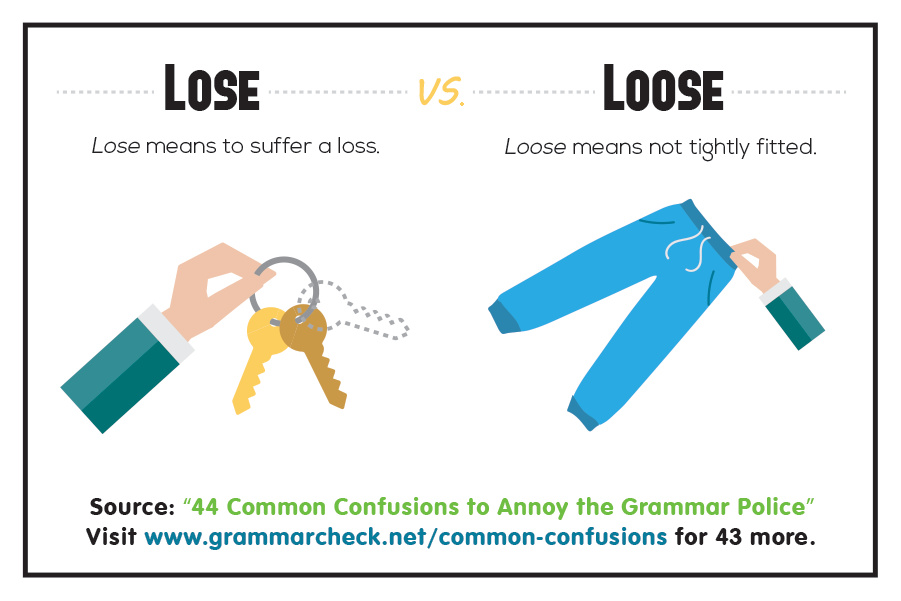
Lose is a verb and means to suffer a loss.
Loose is an adjective and refers to something that is not tight, tightly fitted.
Examples:
- I've lost two hours of my life searching for that lost car key.
- He enjoys that extra air around his breech in those loose pants.
31. Meet vs. "Meet with"
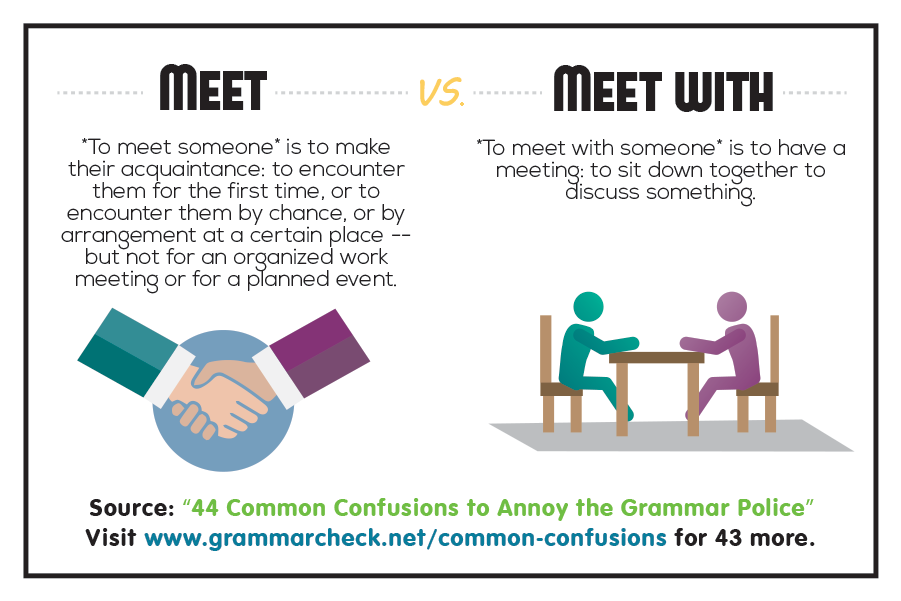
"To meet with someone" is to have a meeting: to sit down together to discuss something. "To meet someone" is to make their acquaintance: to encounter them for the first time, or to encounter them by chance, or by arrangement at a certain place -- but not for an organized work meeting or for a planned event. "Meet with" is especially common in American English.
Examples:
- I usually meet my girlfriend at 12:59.
- We can meet with the professor Tuesday morning.
32. Me vs. Myself vs. I
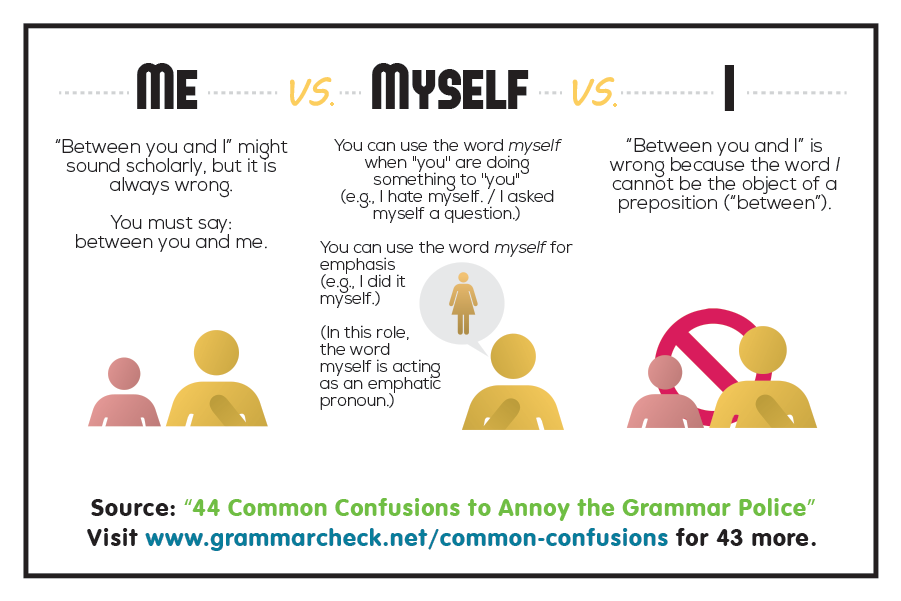
"Between you and I" might sound scholarly, but it is always wrong.
You must say: "between you and me." It's wrong because the word I cannot be the object of a preposition (“between”).
You can use the word myself when "you" are doing something to "you" (e.g., I hate myself. / I asked myself a question.)
(In this role, the word myself is acting as a reflexive pronoun.)
You can use the word myself for emphasis (e.g., I did it myself.) (In this role, the word myself is acting as an emphatic pronoun.)
These are the only times you can use myself. Do not use myself because you think it sounds particularly formal or polite (e.g., Please contact myself if you have any questions.)
33. "Most important" vs. "Most importantly"
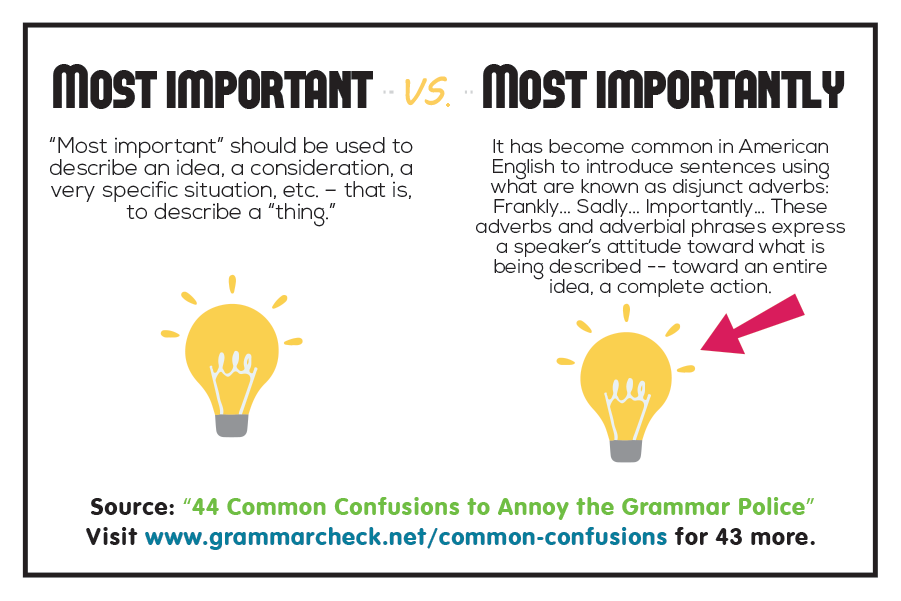
The most important point to remember about these two phrases is that "most important" should be used to describe an idea, a consideration, a very specific situation, etc. – that is, to describe a “thing.” A thing (a noun) is important (or most important), not importantly.
It has become common in American English to introduce sentences using what are known as disjunct adverbs: Frankly... Sadly... Importantly... These adverbs and adverbial phrases express a speaker’s attitude toward what is being described -- toward an entire idea, a complete action.
Examples:
- The most important number to consider is the interest rate that you will pay.
- Most importantly, the suspect had refused to sign the confession, thus making it inadmissible at his trial.
34. Past vs. Passed
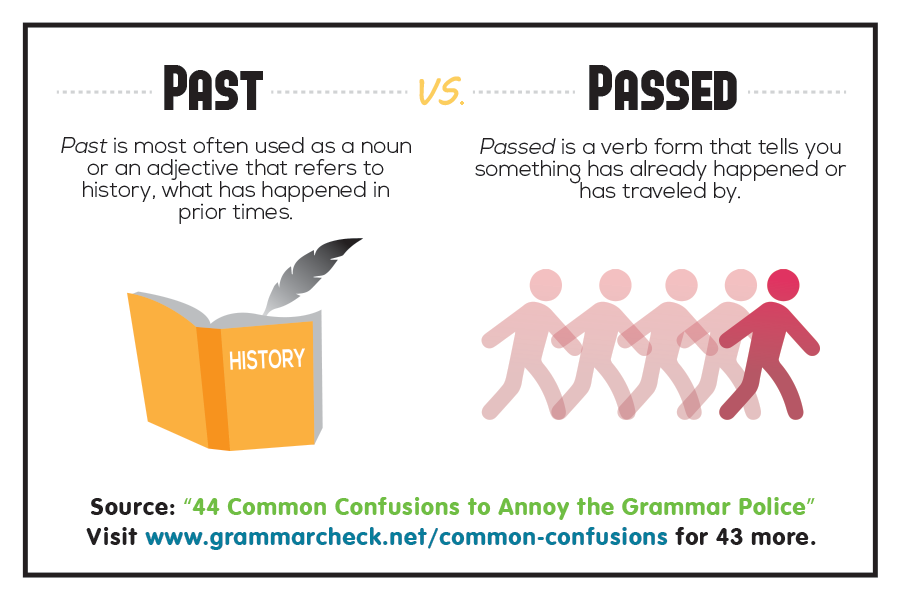
The two words listed here are pronounced exactly the same and are related in meaning. However, past is most often used as a noun or an adjective that refers to history, what has happened in prior times, whereas passed is a verb form that tells you something has already happened or has traveled by.
Examples:
- Richard Nixon’s resignation is an event from America’s past.
- Sam watched with awe as the elephants passed by in the tall savanna grasses.
Notes:
- Past may also be used as an adverb to describe what has gone by (e.g., “The race car streaked past the spectators.”
- Passed is sometimes used as a synonym for “died” (e.g., “My mother passed two years ago.”), but this usage is colloquial and is often considered to be overly euphemistic.
35. Pore vs. Pour
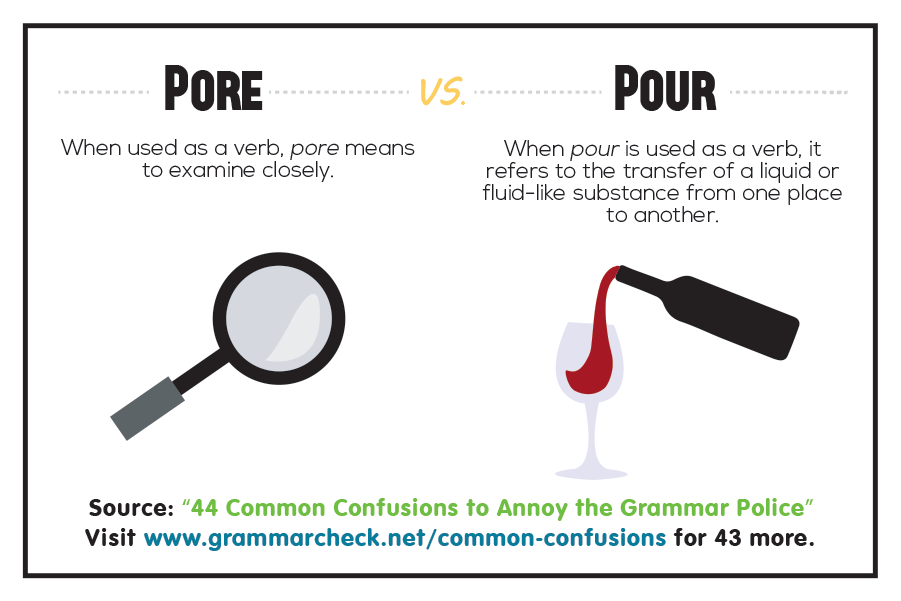
When used as a verb, pore means to examine closely. When pour is used as a verb, it refers to the transfer of a liquid or fluid-like substance from one place to another.
Examples:
- Benny would pore over each old comic book, hoping to find one that was valuable.
- Can you please pour me a glass of cherry lemonade?
36. Preying vs. Praying
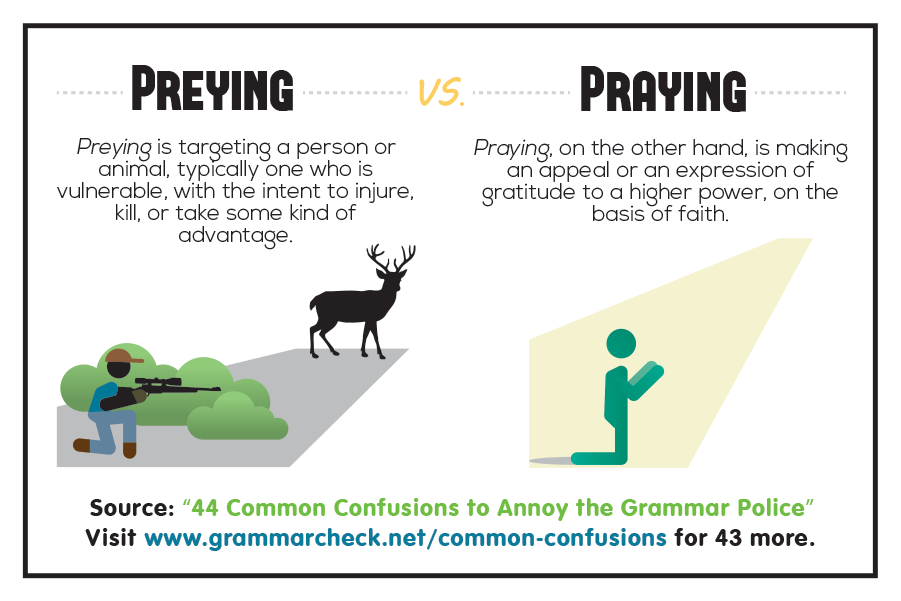
Preying is targeting a person or animal, typically one who is vulnerable, with the intent to injure, kill, or take some kind of advantage. Praying, on the other hand, is making an appeal or an expression of gratitude to a higher power, on the basis of faith.
Examples:
- The coyotes in the nearby woods have been preying on the neighborhood cats.
- We have been praying for good health and renewed friendships.
37. Saw vs. Seen
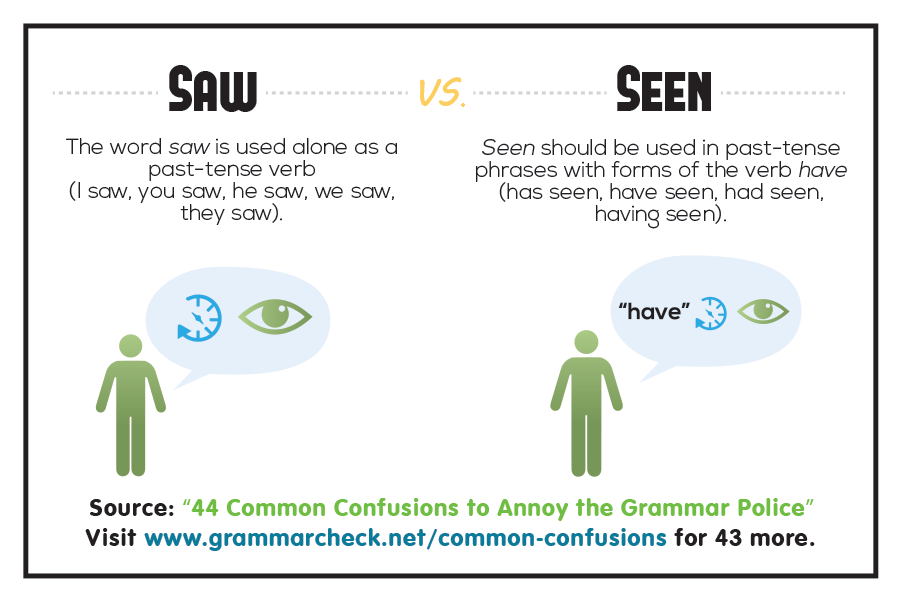
When someone wants to describe a sight, a vision, that happened in the past, either saw or seen may be an appropriate verb to use. Some under-educated people tend to incorrectly use the word saw as the past participle, rather than the correct seen. In short: seen should be used in past-tense phrases with forms of the verb have (has seen, have seen, had seen, having seen). The word saw is used alone as a past-tense verb (I saw, you saw, he saw, we saw, they saw).
Examples:
- We saw the Beatles perform before they were famous. Marcus has seen more chicken embryos than he can count.
38. Staunch vs. Stanch
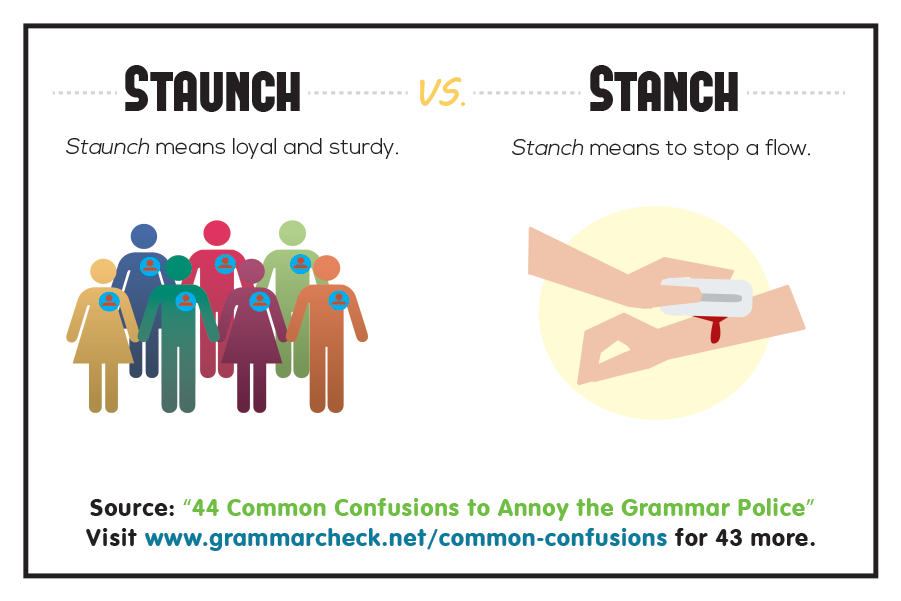
Staunch means loyal and sturdy and does not mean to stanch a flow.
Examples:
- Her staunch supporters defended her in the press.
- The nurse was able to stanch the bleeding.
Hint:
Despite their different meanings, both stanch and staunch derive, ultimately, from a Latin word meaning watertight (and in the sense of “something that has no outflow,” they are etymological cousins of “stagnant”). While stanch is usually used exclusively as a verb, staunch is always an adjective; the sense of loyal or sturdy is thought to derive from the reliability of watertight containers.
39. There vs. their vs. "they’re"
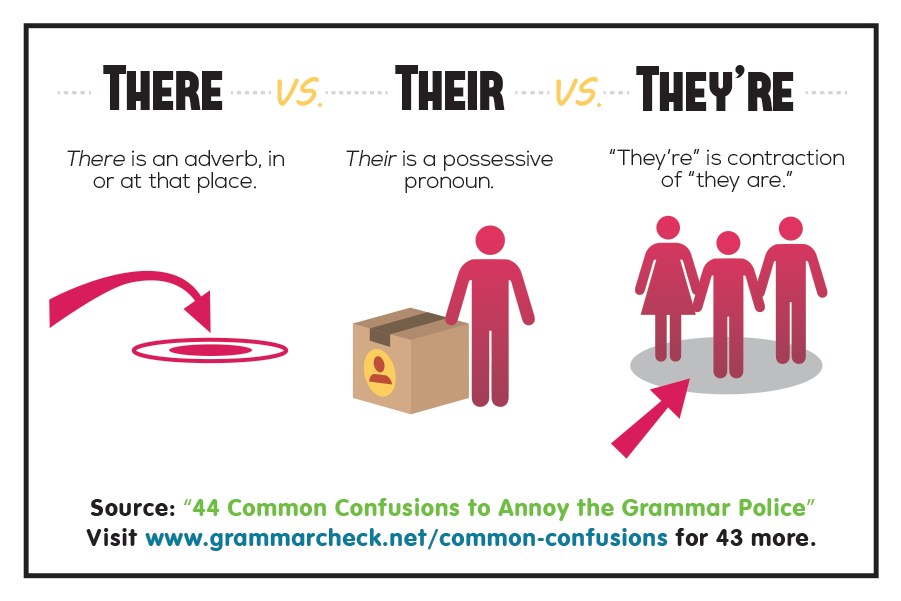
There is an adverb and referring to a location, physical or otherwise.
Their is a possessive pronoun.
"They're" is a contraction of "they are."
40. Waive vs. Wave vs. Waver vs. Waiver
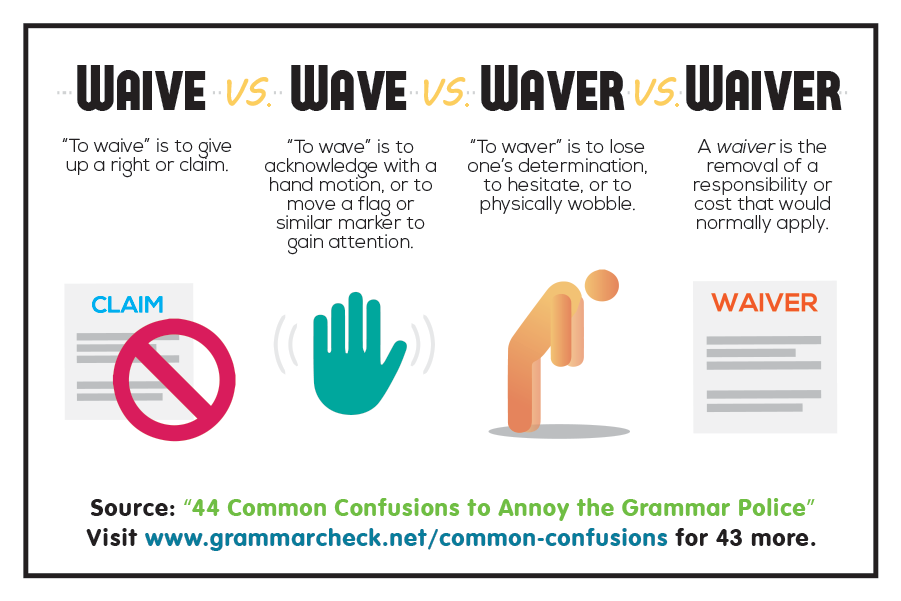
"To waive" is to give up a right or claim. "To wave" is to acknowledge with a hand motion, or to move a flag or similar marker to gain attention. "To waver" is to lose one’s determination, to hesitate, or to physically wobble. A waiver is the removal of a responsibility or cost that would normally apply.
Examples:
- The defendant waived her right to a jury trial; she believed that her best chance for a favorable verdict lay directly with the judge.
- Queen Elizabeth of England is famous for her white-gloved royal wave.
- The scholarship student received a waiver of the $85 sports participation fee.
41. Were vs. We’re vs. Where vs. Wear
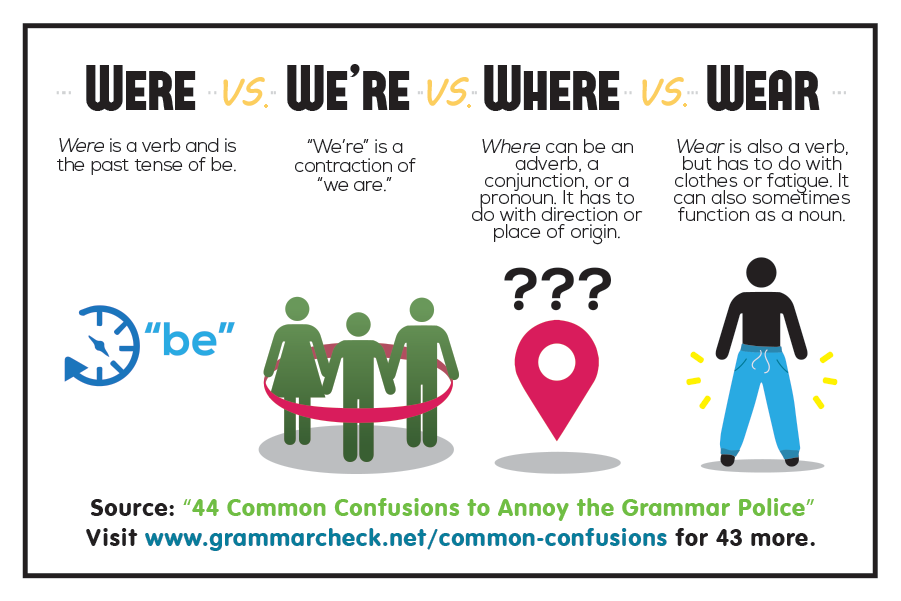
All four words have structural or spelling differences: Were is a verb and is the past tense of be. "We’re" is a contraction of "we are." Where can be an adverb, a conjunction, or a pronoun. It has to do with direction or place of origin. Wear is also a verb, but has to do with clothes or fatigue. It can also sometimes function as a noun.
Examples:
- We were unstoppable when we played soccer in high school.
- We like to pretend that we’re still unstoppable.
- Where did you go to high school?
- What color uniforms did your school’s teams wear?
Hint:
As always, any word that contains an apostrophe (e.g., we’re) has “lost” a letter or letters, and the apostrophe is standing in for the lost letter[s]. Here, the apostrophe stands in for the “a” that is lost when “we are” becomes we’re.
42. Who vs. Whom
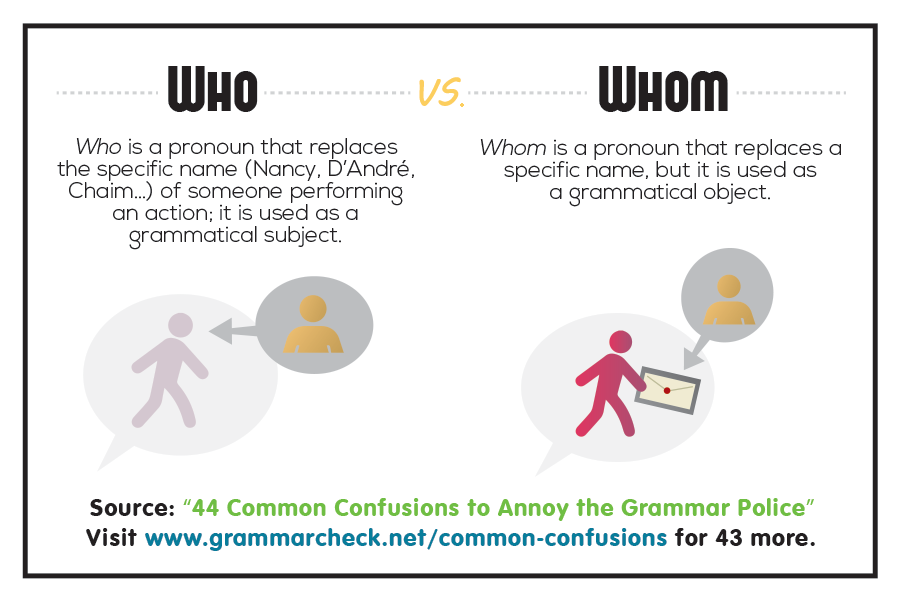
Who is a pronoun that replaces the specific name (Nancy, D’André, Chaim...) of someone performing an action; it is used as a grammatical subject. Whom is a pronoun that replaces a specific name, but it is used as a grammatical object (direct object, indirect object, or object of a preposition). Sometimes, people think that whom sounds rather posh, and so they use that form of the word in preference to who, and yet that usage may not be correct.
Hint:
- Find out whether to use who or whom by answering with he or him.
- If the answer is he, use who. If the answer is him, use whom.
(Of course, she and her work too, but he and him sound more like who and whom, so it’s a simpler test.)
- Who won the prize? Him -> Wrong. He -> Correct! He won the prize.
- To whom was the prize given? He -> Wrong. Him -> Correct! The prize was given to him.
43. Whose vs. "who’s"
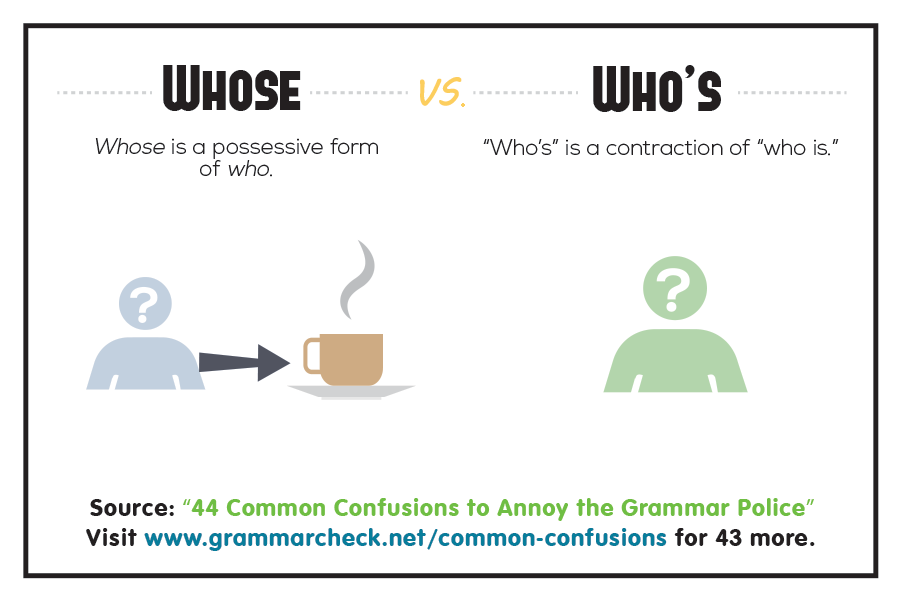
Whose is a possessive form of who.
"Who's" is a contraction of "who is."
Examples:
- Whose coffee cup is that on the table? [To whom belongs that coffee (cup) on the table?]
- Who's that? Her coffee smells so good.
44. "You’re" vs. Your
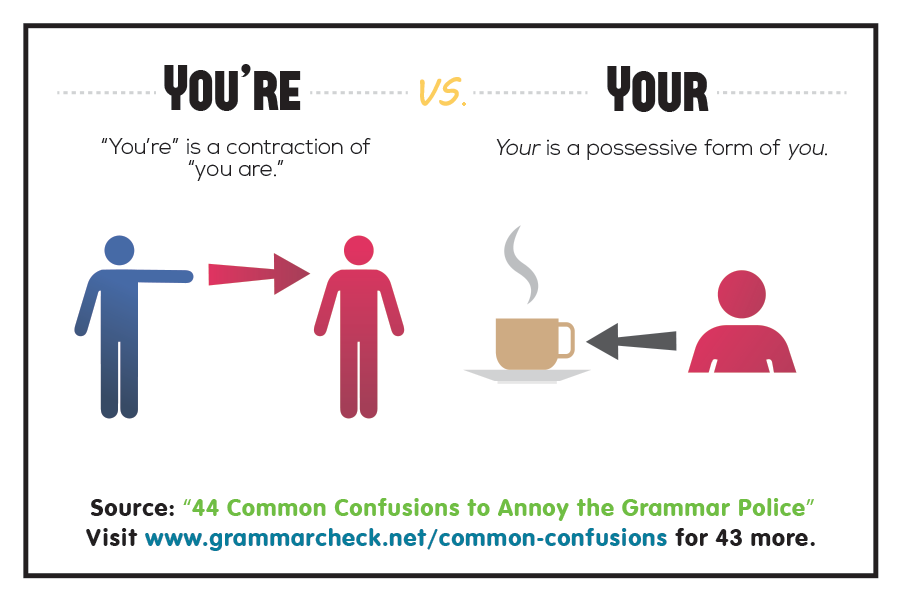
"You're" is a contraction of "you are."
Your is a possessive form of you.
Examples:
- You're such an amazing person.
- Your Himalayan coffee smells so good.

